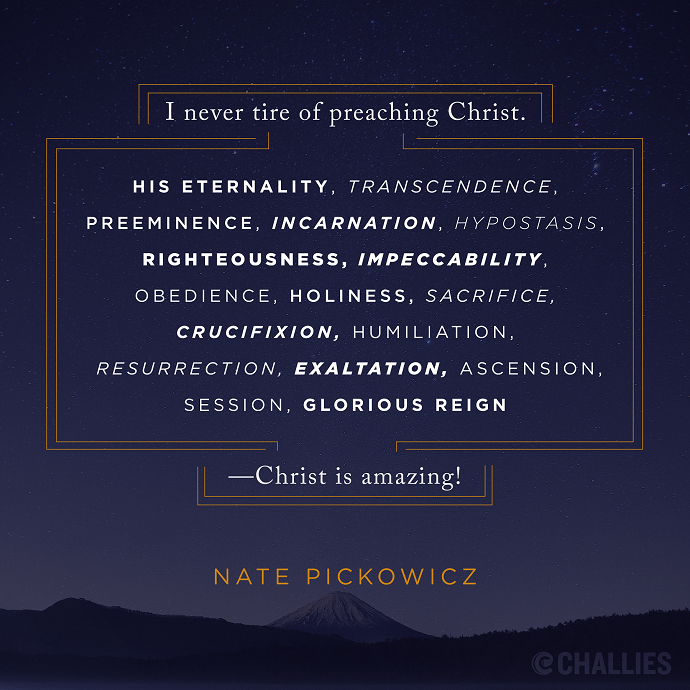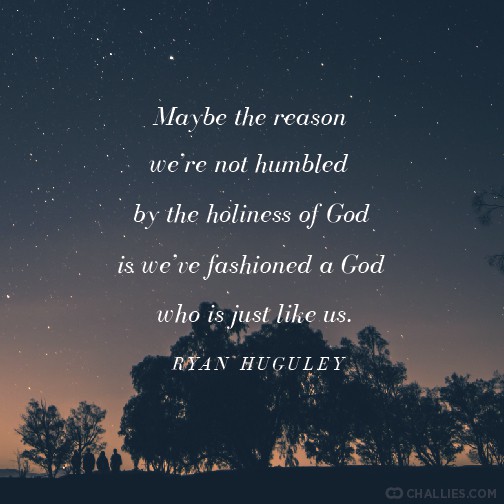 A La Carte: But it's good / A new song / A spiritual tsunami / Sports betting / Loving your closest neighbor / Being Christian has made you a better man / and more.]]>
A La Carte: But it's good / A new song / A spiritual tsunami / Sports betting / Loving your closest neighbor / Being Christian has made you a better man / and more.]]>
I’m grateful to P&R for sponsoring the blog this week. They wanted to ensure you had heard about a new book on apologetics titled Every Believer Confident. The book “simplifies apologetics and empowers Christians to effectively present the gospel in all its glory and rationality.”
There are, indeed, some new Kindle deals today. You should also check out Westminster Books where they’ve got a deal on Gavin Ortlund’s new book about disagreeing but remaining friends.
(Yesterday on the blog: Lest We Drift)
But It’s Good
Melissa has a good one here. “God uses all kinds of means to refine us, to make us more like Jesus. And there isn’t much that will cause us to cling to Him more than the unexpected. We often feel afraid, cheated, angry, and alone when our visions of what would be are shattered. Once we are operating in the heartspace of what could have been, well, it takes time for us to begin to see God’s work in us.”
As I Go Your Way (Aleph) (Video)
I had never heard of the band Stillcreek until yesterday, but then basically listened to their music on repeat. They are singing their way through Psalm 119 and doing so beautifully. I have linked to the first song here, but look up the EP on Spotify or Apple Music or whatever you use.
Tide of Faith or Spiritual Tsunami?
Stephen always asks good questions. “Here’s a question for the church as it stands in the shallows of the post-Christian beach in the West: Are we simply preparing ourselves for an orderly returning tide of faith, or are we preparing ourselves for a returning, tumultuous spiritual tsunami that will upend our practices, challenge our assumptions about reality and refuse our neat categories?”
The Sports Betting House Always Wins. Who Loses? We Do.
I know I have linked to quite a few articles on sports betting, but I do so because I’m so concerned about young men getting sucked into it. “Don’t be fooled by how destigmatized sports betting has become. Just because you can now do it on your phone from the comfort of your suburban living room, as opposed to in the dimly lit, smoky Vegas casino, doesn’t mean the dangers are less real. The less seedy, more acceptable ‘brand’ of sports betting today is what makes it so concerning.”
Loving Your Closest Neighbor
“My friends talk a lot these days about how to spend more time with others in person. We sincerely wish we could be more present with the people we care about most. And we all acknowledge that our screens get in the way. We want to be personally attentive, but battle the incessant magnetism of our phones.”
Being a Christian Has Made You a Better Man
What a great thing it is when being a Christian makes you a better man. This article comes from the mission field but could apply to any believer.
Flashback: The Tallest Trees and the Strongest Winds
The trees that reach the highest heights had better be certain their roots reach far into the ground where they can be stabilized and supported, where they can drink deeply and grow strong.
]]> This week the blog is sponsored by Burke Care. Those who fear you shall see me and rejoice, because I have hoped in your word. Psalm 119:74 With the year ending, we were recently invited to a small gathering about 30 minutes away from where we live. We met the usual traffic delays getting to the house. It was already dark due to the shortened daylight hours in fall. It was a misting rain, the kind you get in the South in December. We arrived safe and comfortable. The conversation was delightful, and it was fun to hear about everyone’s family and the recent updates since we had last met. Each household there attends different churches so there were updates on community and upcoming events and plans. I had taken a moment prior to that evening to think about being invited to such a gathering. My past has not always included being invited to such a gathering. Redemption has taken place in my life and attending such a meal with such godly men and women as not always been part of my past. It is not often that I proactively consider being part of such an occasion. But this time, I did think about the relevance of being invited to such a gathering. I even awkwardly tried to express my gratitude to being included in such a grace-filled, redemptive family gathering of brothers and sisters in Christ. It is important to note that without Jesus’s intervention in my life, I would not be a part…]]>
This week the blog is sponsored by Burke Care. Those who fear you shall see me and rejoice, because I have hoped in your word. Psalm 119:74 With the year ending, we were recently invited to a small gathering about 30 minutes away from where we live. We met the usual traffic delays getting to the house. It was already dark due to the shortened daylight hours in fall. It was a misting rain, the kind you get in the South in December. We arrived safe and comfortable. The conversation was delightful, and it was fun to hear about everyone’s family and the recent updates since we had last met. Each household there attends different churches so there were updates on community and upcoming events and plans. I had taken a moment prior to that evening to think about being invited to such a gathering. My past has not always included being invited to such a gathering. Redemption has taken place in my life and attending such a meal with such godly men and women as not always been part of my past. It is not often that I proactively consider being part of such an occasion. But this time, I did think about the relevance of being invited to such a gathering. I even awkwardly tried to express my gratitude to being included in such a grace-filled, redemptive family gathering of brothers and sisters in Christ. It is important to note that without Jesus’s intervention in my life, I would not be a part…]]>
This week the blog is sponsored by Burke Care.
Those who fear you shall see me and rejoice, because I have hoped in your word. Psalm 119:74
With the year ending, we were recently invited to a small gathering about 30 minutes away from where we live. We met the usual traffic delays getting to the house. It was already dark due to the shortened daylight hours in fall. It was a misting rain, the kind you get in the South in December.
We arrived safe and comfortable. The conversation was delightful, and it was fun to hear about everyone’s family and the recent updates since we had last met. Each household there attends different churches so there were updates on community and upcoming events and plans.
I had taken a moment prior to that evening to think about being invited to such a gathering. My past has not always included being invited to such a gathering. Redemption has taken place in my life and attending such a meal with such godly men and women as not always been part of my past. It is not often that I proactively consider being part of such an occasion. But this time, I did think about the relevance of being invited to such a gathering.
I even awkwardly tried to express my gratitude to being included in such a grace-filled, redemptive family gathering of brothers and sisters in Christ. It is important to note that without Jesus’s intervention in my life, I would not be a part of such a moment. I verbalized my thankfulness to the group which was met with polite deflecting, but I was honest. Me being invited to such an event is an enormous testimony to what God has done in my life that should not go unnoticed.
It is humbling to consider that Jesus came down from his throne in heaven to provide a way for God to reconcile His children back to Himself. Even though I was His enemy, “He loved me.”
The saying is trustworthy and deserving of full acceptance, that Christ Jesus came into the world to save sinners, of whom I am the foremost. – 1 Timothy 1:15 ESV
For if while we were enemies we were reconciled to God by the death of his Son, much more, now that we are reconciled, shall we be saved by his life. – Romans 5:10 ESV
For God so loved the world, that he gave his only Son, that whoever believes in him should not perish but have eternal life.
– John 3:16 ESV
“Those who fear you…” I was born into a family that feared others more than they feared God. They taught me that what other people thought of me was more important that following the God of the Bible. I am eternally grateful that the Holy Spirit responded to God’s call on my heart and resurrected me from being “dead in my trespasses.” (Eph 2:5).
“…shall see me and rejoice,” It is a joy to sit and share a meal with my brothers and sisters in Christ. My new family teaches me, loves me, cares for me, corrects me, encourages me, and enjoys me. This is no small miracle knowing where I have been in my past. It is a mystery as to how God has started, been committed to, and is dedicated to bringing my transformed life to completion. (Phil 1:56)
“…because I have hoped in your word” The common denominator in all of us around the dinner table that evening was our love for the God of the Bible. The Truth of Scripture found in the person of Jesus Christ is where our hope lies. It is Jesus’ return that keeps us actively waiting, abiding in faith, hope, and love. (1 Cor 12:13)
As the Advent season of waiting ends and the infant Jesus has arrived in the manger in Bethlehem on Christmas, we enter a new liturgical season. “The Feast of Epiphany celebrates the appearing of the Son of God among us as one of us – both fully divine and fully human.” *
I encourage you to take inventory of how God’s presence in your life has changed you and those around you. I pray that the revelation of the God of the Bible in your life will shine forth and you will see more clearly the path God has you on, for His glory and your good.
If you have more questions about your life and the friend group you find yourself with, Burke Care would love to talk with you. We would love to hear your story.
*Desiring God, “The Irony of the Epiphany” by David Mathis
Father God, thank you for adopting me into your family and putting so many wonderful people around me. I need You and I need healthy, safe community around me. I want to love You more and to love those You have placed around me more. Grant me all the love, grace, and peace to walk in this calling You have on my life. Amen.
…even when we were dead in our trespasses, made us alive together with Christ—by grace you have been saved… – Ephesians 2:5 ESV
And I am sure of this, that he who began a good work in you will bring it to completion at the day of Jesus Christ. – Philippians 1:56 ESV
So now faith, hope, and love abide, these three; but the greatest of these is love. – 1 Corinthians 13:13 ESV
Application Questions:
- In what ways do I still feel shame about the things I do and the crowd I run with?
- How can I break from my life of former sin and walk in the truth of God’s grace in my life?
- God, are you good? Why do I run back to the things I do not want to do so easily?
To learn more about Burke Care or find a counselor, you can go to www.burkecare.org. You can find more Psalm 119 blog posts at Care thru Psalm 119 — Burke Care
Schedule Care Today | Info@burkecare.org | 512.522.2580 | Subscribe
 As you probably know, I have quite a fascination with Christian books and like to keep up with latest releases. Just about every month I scour the catalogs and websites to see what looks most noteworthy. What follows is my list for October 2021, each title followed by its editorial description. I hope there’s something here that will interest you! Send Out Your Light: The Illuminating Power of Scripture and Song by Sandra McCracken. “In the middle of Psalm 43, God offers us a dynamic invitation: Send out your light.Prolific singer-songwriter Sandra McCracken believes we each have the opportunity to hear and answer this invitation. This book is written in three parts: part one is the becoming, the creation, how God makes us and gives us an identity. Part two is the disorientation of loss, displacement, and the dark night of the soul. Part three is reorientation, how God brings us through the darkness and illuminates our path with Scripture, sending us out to take his light to others. This has been the shape of Sandra McCracken’s life. Through it all, songs and Scripture have been there to light the way, helping her respond to God’s call. How will you respond to God’s call to send out his light?” (Buy it at Amazon or Westminster Books) Dating with Discernment: 12 Questions to Make a Lasting Marriage by Sam Andreades. “Done with dating? Don’t know where to start? Wondering if your date is the one to marry? Pastor-scholar Sam Andreades brings single Christians in that vulnerable…]]>
As you probably know, I have quite a fascination with Christian books and like to keep up with latest releases. Just about every month I scour the catalogs and websites to see what looks most noteworthy. What follows is my list for October 2021, each title followed by its editorial description. I hope there’s something here that will interest you! Send Out Your Light: The Illuminating Power of Scripture and Song by Sandra McCracken. “In the middle of Psalm 43, God offers us a dynamic invitation: Send out your light.Prolific singer-songwriter Sandra McCracken believes we each have the opportunity to hear and answer this invitation. This book is written in three parts: part one is the becoming, the creation, how God makes us and gives us an identity. Part two is the disorientation of loss, displacement, and the dark night of the soul. Part three is reorientation, how God brings us through the darkness and illuminates our path with Scripture, sending us out to take his light to others. This has been the shape of Sandra McCracken’s life. Through it all, songs and Scripture have been there to light the way, helping her respond to God’s call. How will you respond to God’s call to send out his light?” (Buy it at Amazon or Westminster Books) Dating with Discernment: 12 Questions to Make a Lasting Marriage by Sam Andreades. “Done with dating? Don’t know where to start? Wondering if your date is the one to marry? Pastor-scholar Sam Andreades brings single Christians in that vulnerable…]]>
As you probably know, I have quite a fascination with Christian books and like to keep up with latest releases. Just about every month I scour the catalogs and websites to see what looks most noteworthy. What follows is my list for October 2021, each title followed by its editorial description. I hope there’s something here that will interest you!
 Send Out Your Light: The Illuminating Power of Scripture and Song by Sandra McCracken. “In the middle of Psalm 43, God offers us a dynamic invitation: Send out your light.Prolific singer-songwriter Sandra McCracken believes we each have the opportunity to hear and answer this invitation. This book is written in three parts: part one is the becoming, the creation, how God makes us and gives us an identity. Part two is the disorientation of loss, displacement, and the dark night of the soul. Part three is reorientation, how God brings us through the darkness and illuminates our path with Scripture, sending us out to take his light to others. This has been the shape of Sandra McCracken’s life. Through it all, songs and Scripture have been there to light the way, helping her respond to God’s call. How will you respond to God’s call to send out his light?” (Buy it at Amazon or Westminster Books)
Send Out Your Light: The Illuminating Power of Scripture and Song by Sandra McCracken. “In the middle of Psalm 43, God offers us a dynamic invitation: Send out your light.Prolific singer-songwriter Sandra McCracken believes we each have the opportunity to hear and answer this invitation. This book is written in three parts: part one is the becoming, the creation, how God makes us and gives us an identity. Part two is the disorientation of loss, displacement, and the dark night of the soul. Part three is reorientation, how God brings us through the darkness and illuminates our path with Scripture, sending us out to take his light to others. This has been the shape of Sandra McCracken’s life. Through it all, songs and Scripture have been there to light the way, helping her respond to God’s call. How will you respond to God’s call to send out his light?” (Buy it at Amazon or Westminster Books)
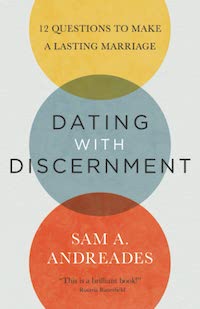 Dating with Discernment: 12 Questions to Make a Lasting Marriage by Sam Andreades. “Done with dating? Don’t know where to start? Wondering if your date is the one to marry? Pastor-scholar Sam Andreades brings single Christians in that vulnerable life moment the practical, theological help to make the dangerous decision confidently. Bringing the Bible’s wisdom on relationships to bear on the dating scene, he helps you lay a foundation for a love that lasts. This book will teach you how to: Confidently say good-bye to ill-suited suitors; Deepen your relationship with God as you date; Find, and make a lifelong commitment to, a worthy, compatible mate; Understand the role of gender in developing intimacy; Form a strong foundation for marriage in your dating as you grow into what marriage is about.” (Buy it at Amazon or Westminster Books)
Dating with Discernment: 12 Questions to Make a Lasting Marriage by Sam Andreades. “Done with dating? Don’t know where to start? Wondering if your date is the one to marry? Pastor-scholar Sam Andreades brings single Christians in that vulnerable life moment the practical, theological help to make the dangerous decision confidently. Bringing the Bible’s wisdom on relationships to bear on the dating scene, he helps you lay a foundation for a love that lasts. This book will teach you how to: Confidently say good-bye to ill-suited suitors; Deepen your relationship with God as you date; Find, and make a lifelong commitment to, a worthy, compatible mate; Understand the role of gender in developing intimacy; Form a strong foundation for marriage in your dating as you grow into what marriage is about.” (Buy it at Amazon or Westminster Books)
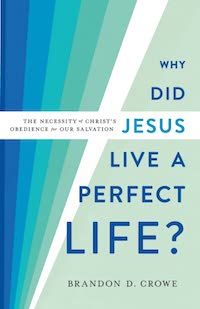 Why Did Jesus Live a Perfect Life?: The Necessity of Christ’s Obedience for Our Salvation by Brandon Crowe. “How does Christ’s obedience relate to our salvation? Speaking into current conversations about the nature of salvation, New Testament scholar Brandon Crowe sets out a new, comprehensive account of the nature of the atonement, exploring how this doctrine affects our participation in the life of God and in the shared life of the Christian community. Crowe builds on key insights from other historic substitutionary views, especially those associated with penal substitution, while clearing up persistent misunderstandings regarding those models. Crowe argues that we are saved by Christ’s perfect obedience, which has implications for understanding the gospel message, Christian hope, and discipleship. Not only is Jesus the quintessential model of faithfulness in a fallen world, but his unique work frees us from the burden of perfect obedience. This book will appeal to professors and students of the New Testament, pastors, and laypeople.” (Buy it at Amazon or Westminster Books)
Why Did Jesus Live a Perfect Life?: The Necessity of Christ’s Obedience for Our Salvation by Brandon Crowe. “How does Christ’s obedience relate to our salvation? Speaking into current conversations about the nature of salvation, New Testament scholar Brandon Crowe sets out a new, comprehensive account of the nature of the atonement, exploring how this doctrine affects our participation in the life of God and in the shared life of the Christian community. Crowe builds on key insights from other historic substitutionary views, especially those associated with penal substitution, while clearing up persistent misunderstandings regarding those models. Crowe argues that we are saved by Christ’s perfect obedience, which has implications for understanding the gospel message, Christian hope, and discipleship. Not only is Jesus the quintessential model of faithfulness in a fallen world, but his unique work frees us from the burden of perfect obedience. This book will appeal to professors and students of the New Testament, pastors, and laypeople.” (Buy it at Amazon or Westminster Books)
 The Jesus I Wish I Knew in High School, edited by Cameron Cole & Charlotte Getz. “The pressure of being a teenager can be overwhelming. School, sports, jobs, and relationships all press in at the same time. But the hardest thing can be feeling alone, that you have no one to share your most difficult problems with. In The Jesus I Wish I Knew in High School, thirty authors from many different backgrounds come together to say, ‘We get it―and Jesus gets it too. Here’s who Jesus is and how he wants to meet you in this intense time.’ Hear from authors such as Scott Sauls, Sandra McCracken, Michelle Reyes, Jen Pollock Michel, David Zahl, and others as they share firsthand stories of bullying, eating disorders, pregnancy, addiction, racism, family conflict, expectations, and the intense pressure to achieve. See how their encounters with Jesus brought healing, rest, and purpose to their lives and hear what they wish they knew earlier: when you know Jesus, you know what it’s like to be perfectly loved and accepted, have hope for the future, and experience grace and mercy when you mess up.” (Buy it at Amazon or Westminster Books)
The Jesus I Wish I Knew in High School, edited by Cameron Cole & Charlotte Getz. “The pressure of being a teenager can be overwhelming. School, sports, jobs, and relationships all press in at the same time. But the hardest thing can be feeling alone, that you have no one to share your most difficult problems with. In The Jesus I Wish I Knew in High School, thirty authors from many different backgrounds come together to say, ‘We get it―and Jesus gets it too. Here’s who Jesus is and how he wants to meet you in this intense time.’ Hear from authors such as Scott Sauls, Sandra McCracken, Michelle Reyes, Jen Pollock Michel, David Zahl, and others as they share firsthand stories of bullying, eating disorders, pregnancy, addiction, racism, family conflict, expectations, and the intense pressure to achieve. See how their encounters with Jesus brought healing, rest, and purpose to their lives and hear what they wish they knew earlier: when you know Jesus, you know what it’s like to be perfectly loved and accepted, have hope for the future, and experience grace and mercy when you mess up.” (Buy it at Amazon or Westminster Books)
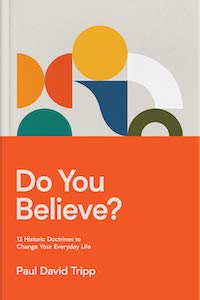 Do You Believe?: 12 Historic Doctrines to Change Your Everyday Life by Paul David Tripp. “Doctrine―what Christians believe―directly influences how they live. The biblical truths about God, humanity, and the world are not merely about knowing more―they are also about loving God and making sense of this life and the life to come. But what happens when there is disparity between what believers confess and how they live? In his latest book, Do You Believe?, pastor and best-selling author Paul David Tripp takes a close look at 12 core doctrines and how they engage and transform the human heart and mind. According to Tripp, ‘true belief is always lived.’ To demonstrate, he unpacks each doctrine and presents its relevance for the Christian life. As readers explore topics such as the doctrine of God, the holiness of God, and the doctrine of Scripture, they will be fueled to fall deeper in love with and stand in awe of their Creator and Father―putting the truths of God’s word on display for all the world to see.” (Buy it at Amazon or Westminster Books)
Do You Believe?: 12 Historic Doctrines to Change Your Everyday Life by Paul David Tripp. “Doctrine―what Christians believe―directly influences how they live. The biblical truths about God, humanity, and the world are not merely about knowing more―they are also about loving God and making sense of this life and the life to come. But what happens when there is disparity between what believers confess and how they live? In his latest book, Do You Believe?, pastor and best-selling author Paul David Tripp takes a close look at 12 core doctrines and how they engage and transform the human heart and mind. According to Tripp, ‘true belief is always lived.’ To demonstrate, he unpacks each doctrine and presents its relevance for the Christian life. As readers explore topics such as the doctrine of God, the holiness of God, and the doctrine of Scripture, they will be fueled to fall deeper in love with and stand in awe of their Creator and Father―putting the truths of God’s word on display for all the world to see.” (Buy it at Amazon or Westminster Books)
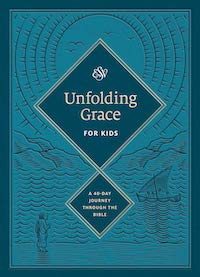 Unfolding Grace for Kids: A 40-Day Journey through the Bible by ESV Bibles. “In Unfolding Grace for Kids, children ages 8–12 are invited on a guided journey through 40 select Scripture readings to uncover the unifying message of God’s Word. Each of the 40 readings is tailored to help encourage consistent time in Scripture and features newly written introductions. Accompanying the readings are captivating illustrations by Peter Voth, inviting children to reflect on what they’ve read. From cover to cover, Unfolding Grace for Kids promotes a love of God’s Word to young readers as they immerse themselves in Scripture through small portions that together tell the overarching story of God’s grace. Free study questions are available for download.” (Buy it at Amazon or Westminster Books)
Unfolding Grace for Kids: A 40-Day Journey through the Bible by ESV Bibles. “In Unfolding Grace for Kids, children ages 8–12 are invited on a guided journey through 40 select Scripture readings to uncover the unifying message of God’s Word. Each of the 40 readings is tailored to help encourage consistent time in Scripture and features newly written introductions. Accompanying the readings are captivating illustrations by Peter Voth, inviting children to reflect on what they’ve read. From cover to cover, Unfolding Grace for Kids promotes a love of God’s Word to young readers as they immerse themselves in Scripture through small portions that together tell the overarching story of God’s grace. Free study questions are available for download.” (Buy it at Amazon or Westminster Books)
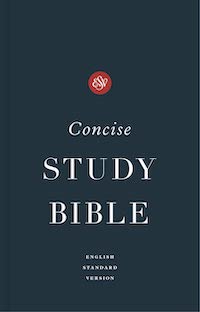 ESV Concise Study Bible by ESV Bibles. “Enjoy the robust content of a study Bible in a concise and accessible format. The ESV Concise Study Bible was created to help readers explore the essential meaning of the Bible. Inspired by the best-selling ESV Study Bible, this robust Bible offers fresh content for new believers and seasoned saints alike, explaining difficult phrases, defining key terms, identifying important people and places, and highlighting links between biblical passages. Featuring 12,000+ study notes; 150+ maps and charts; 15+ illustrations; and an introduction to each book that outlines its setting, background, and key themes, the ESV Concise Study Bible is rich in content yet approachable and easy to carry―perfect for studying God’s Word in any context.” (Buy it at Amazon or Westminster Books)
ESV Concise Study Bible by ESV Bibles. “Enjoy the robust content of a study Bible in a concise and accessible format. The ESV Concise Study Bible was created to help readers explore the essential meaning of the Bible. Inspired by the best-selling ESV Study Bible, this robust Bible offers fresh content for new believers and seasoned saints alike, explaining difficult phrases, defining key terms, identifying important people and places, and highlighting links between biblical passages. Featuring 12,000+ study notes; 150+ maps and charts; 15+ illustrations; and an introduction to each book that outlines its setting, background, and key themes, the ESV Concise Study Bible is rich in content yet approachable and easy to carry―perfect for studying God’s Word in any context.” (Buy it at Amazon or Westminster Books)
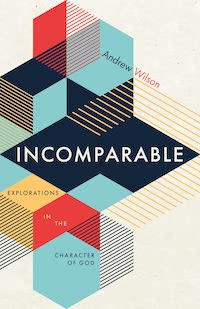 Incomparable: Explorations in the Character of God by Andrew Wilson. “There is no greater pursuit, no greater journey, and no greater joy than discovering the extraordinary character of God. Andrew Wilson’s Incomparable explores sixty names and descriptions of our creator. Each chapter is filled with profound Biblical insights and revelations that will inspire and enrich your faith. Selah moments allow for a time of reflection and worship. And practical applications connect each truth with your daily life. Throughout, Incomparable unfolds the greatest wonder our minds and hearts will ever contemplate. Immerse yourself in His character. Delve into the depths of His presence. And experience a God that is truly beyond compare.” (Buy it at Amazon or Westminster Books)
Incomparable: Explorations in the Character of God by Andrew Wilson. “There is no greater pursuit, no greater journey, and no greater joy than discovering the extraordinary character of God. Andrew Wilson’s Incomparable explores sixty names and descriptions of our creator. Each chapter is filled with profound Biblical insights and revelations that will inspire and enrich your faith. Selah moments allow for a time of reflection and worship. And practical applications connect each truth with your daily life. Throughout, Incomparable unfolds the greatest wonder our minds and hearts will ever contemplate. Immerse yourself in His character. Delve into the depths of His presence. And experience a God that is truly beyond compare.” (Buy it at Amazon or Westminster Books)
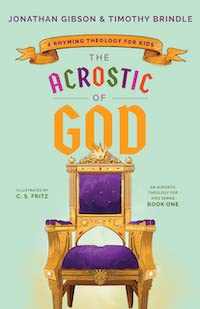 The Acrostic of God: A Rhyming Theology for Kids by Jonathan Gibson & Timothy Brindle. “Catechism can be fun! The Acrostic of God is a joy to read and reread, and a wonderful tool to help kids absorb eternal truth about God. By giving children an alphabetical list of the titles and attributes of God written with a rhyming beat, Jonny Gibson and Timothy Brindle make The Acrostic of God fun to read and easy to memorize. Each characteristic, A to Z, weaves together a beautiful picture of God. Using the alphabet to teach about God has a rich history in the Bible, especially in the Psalms and Lamentations. Several of the psalms—notably Psalm 119—begin with letters of the Hebrew alphabet, forming an acrostic that spells out the entire alphabet. The authors make learning theology fun and effortless. Their book shows God as he is, not “just to know about him more in our brains, but to know him as the God of glory who reigns.” (Buy it at Amazon or Westminster Books)
The Acrostic of God: A Rhyming Theology for Kids by Jonathan Gibson & Timothy Brindle. “Catechism can be fun! The Acrostic of God is a joy to read and reread, and a wonderful tool to help kids absorb eternal truth about God. By giving children an alphabetical list of the titles and attributes of God written with a rhyming beat, Jonny Gibson and Timothy Brindle make The Acrostic of God fun to read and easy to memorize. Each characteristic, A to Z, weaves together a beautiful picture of God. Using the alphabet to teach about God has a rich history in the Bible, especially in the Psalms and Lamentations. Several of the psalms—notably Psalm 119—begin with letters of the Hebrew alphabet, forming an acrostic that spells out the entire alphabet. The authors make learning theology fun and effortless. Their book shows God as he is, not “just to know about him more in our brains, but to know him as the God of glory who reigns.” (Buy it at Amazon or Westminster Books)
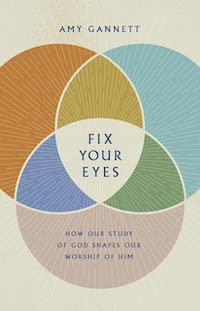 Fix Your Eyes: How Our Study of God Shapes Our Worship of Him by Amy Gannett. “We live in a polarized time. Christians are quick to conceive of themselves either as theologically-minded or worship-minded; either thinking Christians or feeling Christians. The results are damaging: theology without worship is muted, stifled, and cold, and worship without theology is ungrounded, unrooted, and uninformed. This is not the way it was meant to be. Theology (our study and knowledge of God) should always lead to doxology (our worship of Him). Worship should always be rooted in theology. When we study the nature and character of God as revealed in his Word, we are invited to respond in the affectionate, obedient discipleship of worship. How can we keep our theology from being mere head knowledge? How do we give our worship roots that will last? By fixing our eyes on God Himself–the object of our study and the object of our worship. Fix Your Eyes is an invitation to understand core doctrines of the Christian faith and apply them in our daily worship of God. It walks believers through key theological concepts and shows how each can be lived out in daily life.” (Buy it at Amazon or Westminster Books)
Fix Your Eyes: How Our Study of God Shapes Our Worship of Him by Amy Gannett. “We live in a polarized time. Christians are quick to conceive of themselves either as theologically-minded or worship-minded; either thinking Christians or feeling Christians. The results are damaging: theology without worship is muted, stifled, and cold, and worship without theology is ungrounded, unrooted, and uninformed. This is not the way it was meant to be. Theology (our study and knowledge of God) should always lead to doxology (our worship of Him). Worship should always be rooted in theology. When we study the nature and character of God as revealed in his Word, we are invited to respond in the affectionate, obedient discipleship of worship. How can we keep our theology from being mere head knowledge? How do we give our worship roots that will last? By fixing our eyes on God Himself–the object of our study and the object of our worship. Fix Your Eyes is an invitation to understand core doctrines of the Christian faith and apply them in our daily worship of God. It walks believers through key theological concepts and shows how each can be lived out in daily life.” (Buy it at Amazon or Westminster Books)
The Works of Thomas Goodwin, 12 Volumes. “Thomas Goodwin was a prolific author and editor. During the 1630s he coedited with John Ball the works of John Preston and Richard Sibbes. He began to publish his own sermons in 1636. Prior to his death, he had published at least twelve devotional works, most of which were collections of sermons. The fact that they were reissued forty-seven times indicates the high demand and wide circulation of his publications. Most of Goodwin’s major theological writings were the fruit of his riper years and were published posthumously. His unusually large corpus of treatises display a pastoral and scholarly zeal rivaled by few Puritans. Goodwin represents the best of Puritanism in addressing the intellect, will, and heart. His writings reveal the vigor of earlier Puritans such as William Perkins and Richard Sibbes as well as the mature thought of later Puritan divines, supremely represented by Owen. If you want to grow in grace and have your soul fed on the deep things of God, buy and prayerfully read Goodwin’s Works.” (Buy it at Amazon or Westminster Books)
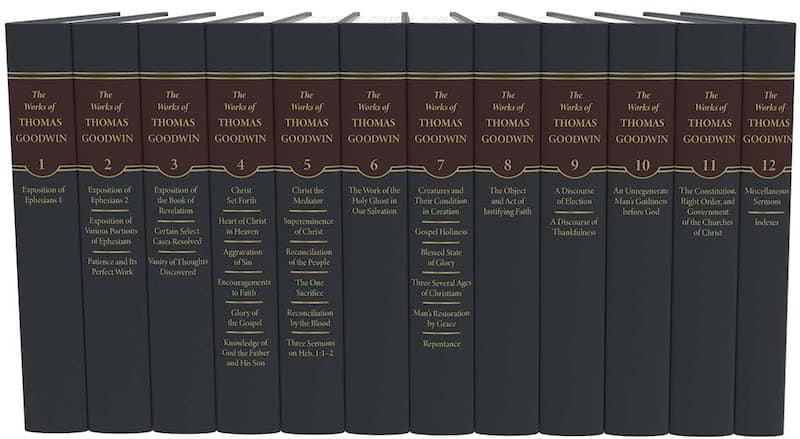
 There are a couple of Kindle deals for you to take a look at today. It certainly has been slow lately… (Yesterday on the blog: 12 Key Statements on Human Sexuality) Take the Time “My mother tells the story. Her dad was going blind. So every morning she or her sister would stop by the home where he stayed. And read the Bible to him. One particular day, Mom was in a hurry. On a tight schedule. She rushed in with no time to spare. Out of breath and talking fast. ‘So, Daddy, which chapter do you want me to read today?’ In his slow Southern drawl, Grandaddy said ‘Well, how about Psalm 119?'” How Can I Obtain Assurance Of Salvation? (Video) Here’s John MacArthur on obtaining assurance of salvation. How Early Christianity was Mocked for Welcoming Women Michael Kruger writes about about the popularity of the Christian faith among women in the days of the early church. “What do we make of the fact that early Christianity was mocked for being pro-women? Well, it certainly turns the tables on the over-used criticism in the modern world that early Christianity was a patriarchal, misogynistic religion that was hostile to women. While that claim is repeated over and over, it is hard to sustain in the context of the ancient world. Indeed, it seems more true of the non-Christian, Greco-Roman elites.” A Catechism on Pastoral Theology Daniel Hyde is building out a catechism on pastoral theology. It’s good! The Church Doesn’t Need Online Watchmen Caleb Wait:…]]>
There are a couple of Kindle deals for you to take a look at today. It certainly has been slow lately… (Yesterday on the blog: 12 Key Statements on Human Sexuality) Take the Time “My mother tells the story. Her dad was going blind. So every morning she or her sister would stop by the home where he stayed. And read the Bible to him. One particular day, Mom was in a hurry. On a tight schedule. She rushed in with no time to spare. Out of breath and talking fast. ‘So, Daddy, which chapter do you want me to read today?’ In his slow Southern drawl, Grandaddy said ‘Well, how about Psalm 119?'” How Can I Obtain Assurance Of Salvation? (Video) Here’s John MacArthur on obtaining assurance of salvation. How Early Christianity was Mocked for Welcoming Women Michael Kruger writes about about the popularity of the Christian faith among women in the days of the early church. “What do we make of the fact that early Christianity was mocked for being pro-women? Well, it certainly turns the tables on the over-used criticism in the modern world that early Christianity was a patriarchal, misogynistic religion that was hostile to women. While that claim is repeated over and over, it is hard to sustain in the context of the ancient world. Indeed, it seems more true of the non-Christian, Greco-Roman elites.” A Catechism on Pastoral Theology Daniel Hyde is building out a catechism on pastoral theology. It’s good! The Church Doesn’t Need Online Watchmen Caleb Wait:…]]>
There are a couple of Kindle deals for you to take a look at today. It certainly has been slow lately…
(Yesterday on the blog: 12 Key Statements on Human Sexuality)
Take the Time
“My mother tells the story. Her dad was going blind. So every morning she or her sister would stop by the home where he stayed. And read the Bible to him. One particular day, Mom was in a hurry. On a tight schedule. She rushed in with no time to spare. Out of breath and talking fast. ‘So, Daddy, which chapter do you want me to read today?’ In his slow Southern drawl, Grandaddy said ‘Well, how about Psalm 119?'”
How Can I Obtain Assurance Of Salvation? (Video)
Here’s John MacArthur on obtaining assurance of salvation.
How Early Christianity was Mocked for Welcoming Women
Michael Kruger writes about about the popularity of the Christian faith among women in the days of the early church. “What do we make of the fact that early Christianity was mocked for being pro-women? Well, it certainly turns the tables on the over-used criticism in the modern world that early Christianity was a patriarchal, misogynistic religion that was hostile to women. While that claim is repeated over and over, it is hard to sustain in the context of the ancient world. Indeed, it seems more true of the non-Christian, Greco-Roman elites.”
A Catechism on Pastoral Theology
Daniel Hyde is building out a catechism on pastoral theology. It’s good!
The Church Doesn’t Need Online Watchmen
Caleb Wait: “Christians on the internet can sometimes be like the fake Batmans in Christopher Nolan’s The Dark Knight—copycat caped crusaders wearing hockey pads and DIY cowls. Our personalities online can often mimic a kind of ‘second life’ as vigilantes: ‘Self-appointed citizens who undertake the role of law enforcement in their community without legal authority, typically because the legal agencies are thought to be inadequate.'”
10 Reasons We Should Still Take The Coronavirus Seriously
WORLD offers some reasons we should still take the coronavirus seriously. “An Alaskan reader challenged us to share 10 reasons to take the coronavirus pandemic seriously—to believe that it is ‘not a hoax,’ as she put it. Her state’s experience with the coronavirus has encouraged its residents to see it as a faraway problem: The entire state has suffered only 17 deaths so far, whereas a single nursing home in my area saw a higher death toll.”
The Jesus Movement Followed 1968. What Will Follow 2020?
1968 was an extremely tumultuous year but, as Donald Whitney points out, “in retrospect, it’s encouraging to realize that rumbling beneath it all, the Jesus Movement was gathering momentum as a work of God’s power that would flourish across the country in the years immediately following. The high-water mark of this decade-long movement was surely Explo ‘72. Some 80,000 young people gathered in Dallas’ Cotton Bowl … to hear Billy Graham preach six times. By the end of the week some 100,000 to 200,000 gathered for a Christian concert that is often credited as the genesis of what became known in the 1970s as Christian Contemporary Music.”
Flashback: The Narrowest Religion in the World
The Christian religion is at once the broadest and the narrowest in the world. It is a faith that admits every possible kind of person. But it admits them in only one way.
]]> There is a little bit of everything in today’s list of Kindle deals. Do remember as we come toward the end of the month to grab your freebies from Logos. (Yesterday on the blog: Training a New Generation of African Pastors and Church Leaders) The Problem of Having no Defined Membership Stephen Kneale makes the case for meaningful and clearly-defined church membership by showing the consequences of having no defined membership. Abortion Regret Isn’t a Myth, Despite New Study “Pro-life advocates and ministry leaders are challenging the results of a new study that found that most women do not suffer emotionally after an abortion, and that over time, they are less likely to express regret.” Make a Streets Map of Anywhere in the World This isn’t the most significant little app you’ll ever use, but it’s still plenty neat. The End of (Secular) Babies Birthrates are falling, which means “if your church wants to demonstrate how dangerous and edgy it is, then it doesn’t need to placard for a cause down the main street of your city. It doesn’t have to instagram or tweet its social justice policies, or take a stand against the hard secular culture. All it has to do is be populated by large families.” If God Can Be Trusted With Death, He Can Be Trusted With Life Seth Lewis: “Quoting promises about Heaven will always be easier than keeping commands about Earth. Trusting God with life after death will always be easier than trusting him with life before it. Yet how…]]>
There is a little bit of everything in today’s list of Kindle deals. Do remember as we come toward the end of the month to grab your freebies from Logos. (Yesterday on the blog: Training a New Generation of African Pastors and Church Leaders) The Problem of Having no Defined Membership Stephen Kneale makes the case for meaningful and clearly-defined church membership by showing the consequences of having no defined membership. Abortion Regret Isn’t a Myth, Despite New Study “Pro-life advocates and ministry leaders are challenging the results of a new study that found that most women do not suffer emotionally after an abortion, and that over time, they are less likely to express regret.” Make a Streets Map of Anywhere in the World This isn’t the most significant little app you’ll ever use, but it’s still plenty neat. The End of (Secular) Babies Birthrates are falling, which means “if your church wants to demonstrate how dangerous and edgy it is, then it doesn’t need to placard for a cause down the main street of your city. It doesn’t have to instagram or tweet its social justice policies, or take a stand against the hard secular culture. All it has to do is be populated by large families.” If God Can Be Trusted With Death, He Can Be Trusted With Life Seth Lewis: “Quoting promises about Heaven will always be easier than keeping commands about Earth. Trusting God with life after death will always be easier than trusting him with life before it. Yet how…]]>
There is a little bit of everything in today’s list of Kindle deals.
Do remember as we come toward the end of the month to grab your freebies from Logos.
(Yesterday on the blog: Training a New Generation of African Pastors and Church Leaders)
The Problem of Having no Defined Membership
Stephen Kneale makes the case for meaningful and clearly-defined church membership by showing the consequences of having no defined membership.
Abortion Regret Isn’t a Myth, Despite New Study
“Pro-life advocates and ministry leaders are challenging the results of a new study that found that most women do not suffer emotionally after an abortion, and that over time, they are less likely to express regret.”
Make a Streets Map of Anywhere in the World
This isn’t the most significant little app you’ll ever use, but it’s still plenty neat.
The End of (Secular) Babies
Birthrates are falling, which means “if your church wants to demonstrate how dangerous and edgy it is, then it doesn’t need to placard for a cause down the main street of your city. It doesn’t have to instagram or tweet its social justice policies, or take a stand against the hard secular culture. All it has to do is be populated by large families.”
If God Can Be Trusted With Death, He Can Be Trusted With Life
Seth Lewis: “Quoting promises about Heaven will always be easier than keeping commands about Earth. Trusting God with life after death will always be easier than trusting him with life before it. Yet how could I say that I trust Jesus with forever, then turn around and ignore everything he says about my life here and now? Wouldn’t this be proof that I haven’t trusted him at all?”
20 Benefits of Being in God’s Word According to Psalm 119
“If only the world could grasp the benefits available to the soul who seeks God through His Word—willing to see it as truth, clinging to it at every turn. For the Word of God is life-changing and life-sustaining and life-giving. And it’s so much more, as the author of Psalm 119 testifies. The psalmist offers us numerous reasons to run to the comfort of Scripture and never turn away from it.”
Little Things Matter Too
You’ve probably had an experience like this at one time or another. “And then a tiny voice in my mind raised this question. ‘What if that couple shows up to church tomorrow?’ Oh. Suddenly I didn’t feel quite so heroic or witty.”
Flashback: We Don’t Sing for Fun
Singing is not prescribed for Christian worship for the purpose of fun. It actually serves a far higher purpose as a means through which we bring mutual encouragement by recounting common truths together.
]]>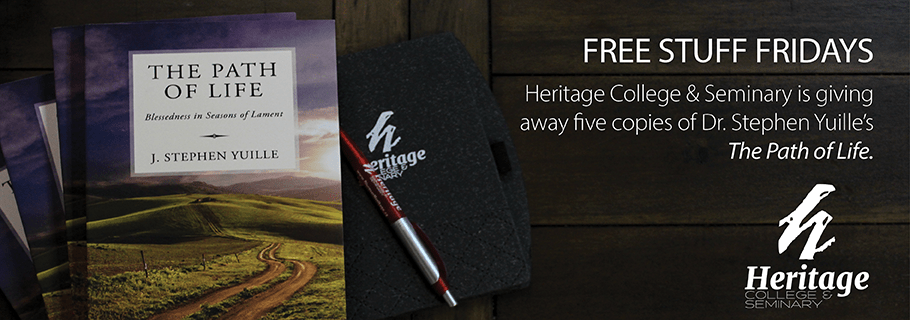 This week, the giveaway has been sponsored by Heritage College & Seminary. They will be giving away five copies of the book The Path of Life by Dr. Stephen Yuille, Vice President of Academics and Academic Dean of the College at Heritage College & Seminary Discovering the Path of Life Psalm 119 is noted for its call to delight in the word of God. But we must not fail to realize that this great psalm is also infused with great lament. In The Path of Life, Dr. Stephen Yuille follows the psalmist through his many ups and downs in order to see how he gives voice to the song in our soul. Here is comfort for bearing sorrow, strength for enduring difficulty, trust for facing uncertainty, and peace for overcoming anxiety. Even in his extremity, the psalmist finds joy in the blessed God. This is how Jesus persevered through trials and endured the cross. And in Christ, you too can take up this psalm, follow the path of life, and find blessedness in your seasons of lament. Enter Here Again, there are five books to win. And all you need to do to enter the draw is to drop your name and email address in the form below. Giveaway Rules: You may enter one time. As soon as the winners have been chosen, all names and addresses will be immediately and permanently erased. Winners will be notified by email. The giveaway closes Saturday at noon. If you are viewing this through email, click to visit…]]>
This week, the giveaway has been sponsored by Heritage College & Seminary. They will be giving away five copies of the book The Path of Life by Dr. Stephen Yuille, Vice President of Academics and Academic Dean of the College at Heritage College & Seminary Discovering the Path of Life Psalm 119 is noted for its call to delight in the word of God. But we must not fail to realize that this great psalm is also infused with great lament. In The Path of Life, Dr. Stephen Yuille follows the psalmist through his many ups and downs in order to see how he gives voice to the song in our soul. Here is comfort for bearing sorrow, strength for enduring difficulty, trust for facing uncertainty, and peace for overcoming anxiety. Even in his extremity, the psalmist finds joy in the blessed God. This is how Jesus persevered through trials and endured the cross. And in Christ, you too can take up this psalm, follow the path of life, and find blessedness in your seasons of lament. Enter Here Again, there are five books to win. And all you need to do to enter the draw is to drop your name and email address in the form below. Giveaway Rules: You may enter one time. As soon as the winners have been chosen, all names and addresses will be immediately and permanently erased. Winners will be notified by email. The giveaway closes Saturday at noon. If you are viewing this through email, click to visit…]]>
This week, the giveaway has been sponsored by Heritage College & Seminary. They will be giving away five copies of the book The Path of Life by Dr. Stephen Yuille, Vice President of Academics and Academic Dean of the College at Heritage College & Seminary
Discovering the Path of Life
Psalm 119 is noted for its call to delight in the word of God. But we must not fail to realize that this great psalm is also infused with great lament.
In The Path of Life, Dr. Stephen Yuille follows the psalmist through his many ups and downs in order to see how he gives voice to the song in our soul. Here is comfort for bearing sorrow, strength for enduring difficulty, trust for facing uncertainty, and peace for overcoming anxiety.
Even in his extremity, the psalmist finds joy in the blessed God. This is how Jesus persevered through trials and endured the cross. And in Christ, you too can take up this psalm, follow the path of life, and find blessedness in your seasons of lament.
Enter Here
Again, there are five books to win. And all you need to do to enter the draw is to drop your name and email address in the form below.
Giveaway Rules: You may enter one time. As soon as the winners have been chosen, all names and addresses will be immediately and permanently erased. Winners will be notified by email. The giveaway closes Saturday at noon. If you are viewing this through email, click to visit my site and enter there.
]]> This week’s Free Stuff Friday is sponsored by The Good Book Company who also sponsored the blog this week. They have 5 packages of their latest releases to give away, which means 5 winners will each receive the following titles: Pray Big by Alistair Begg So many of us struggle with prayer. Many books have been written on the subject and there’s a reason for that. Prayer comes hard to most of us, in most seasons. And when we do pray, we often don’t know what to say. What is it that my Father loves to hear about? What are the best things I could pray for my family, my church, and myself? In Pray Big, renowned Bible teacher Alistair Begg combines warmth, clarity, humor, and practicality as he examines Paul’s prayers for his friends in the church in Ephesus. Paul clearly enjoyed prayer and was excited about it. He expected his Father in heaven to hear what he said, and to act in other people’s lives accordingly. The truths that underpin and shape his prayers will motivate us to pray and set us an example. Jesus and The Lions’ Den by Alison Mitchell The story of Daniel and the Lions’ Den teaches children many things… It teaches them about praying; it teaches them about Daniel’s faithfulness to God, and God’s faithfulness to Daniel; and it teaches them that God is the real king of everyone everywhere. But if you peel back another layer, you’ll see that like the rest of the Old Testament, it…]]>
This week’s Free Stuff Friday is sponsored by The Good Book Company who also sponsored the blog this week. They have 5 packages of their latest releases to give away, which means 5 winners will each receive the following titles: Pray Big by Alistair Begg So many of us struggle with prayer. Many books have been written on the subject and there’s a reason for that. Prayer comes hard to most of us, in most seasons. And when we do pray, we often don’t know what to say. What is it that my Father loves to hear about? What are the best things I could pray for my family, my church, and myself? In Pray Big, renowned Bible teacher Alistair Begg combines warmth, clarity, humor, and practicality as he examines Paul’s prayers for his friends in the church in Ephesus. Paul clearly enjoyed prayer and was excited about it. He expected his Father in heaven to hear what he said, and to act in other people’s lives accordingly. The truths that underpin and shape his prayers will motivate us to pray and set us an example. Jesus and The Lions’ Den by Alison Mitchell The story of Daniel and the Lions’ Den teaches children many things… It teaches them about praying; it teaches them about Daniel’s faithfulness to God, and God’s faithfulness to Daniel; and it teaches them that God is the real king of everyone everywhere. But if you peel back another layer, you’ll see that like the rest of the Old Testament, it…]]>
This week’s Free Stuff Friday is sponsored by The Good Book Company who also sponsored the blog this week. They have 5 packages of their latest releases to give away, which means 5 winners will each receive the following titles:
Pray Big by Alistair Begg
So many of us struggle with prayer. Many books have been written on the subject and there’s a reason for that. Prayer comes hard to most of us, in most seasons. And when we do pray, we often don’t know what to say. What is it that my Father loves to hear about? What are the best things I could pray for my family, my church, and myself?
In Pray Big, renowned Bible teacher Alistair Begg combines warmth, clarity, humor, and practicality as he examines Paul’s prayers for his friends in the church in Ephesus. Paul clearly enjoyed prayer and was excited about it. He expected his Father in heaven to hear what he said, and to act in other people’s lives accordingly. The truths that underpin and shape his prayers will motivate us to pray and set us an example.
Jesus and The Lions’ Den by Alison Mitchell
The story of Daniel and the Lions’ Den teaches children many things… It teaches them about praying; it teaches them about Daniel’s faithfulness to God, and God’s faithfulness to Daniel; and it teaches them that God is the real king of everyone everywhere.
But if you peel back another layer, you’ll see that like the rest of the Old Testament, it also points to Jesus.
Jesus and The Lions’ Den is a stunningly-illustrated retelling of Daniel and the lions’ den helps children to see Jesus in the story of Daniel. It challenges children to spot the ‘Jesus moments’ by looking out for the hidden lion symbols. It goes on to explain the parallels between Jesus and Daniel, so that children can see the gospel heart of the whole Bible.
Repeat The Sounding Joy by Christopher Ash
In this Advent journey through Luke 1 – 2, Christopher Ash brings these familiar passages to life with fresh insight, color, and depth.
As you soak up the Scriptures, you’ll experience the joy of Christmas through the eyes of those who witnessed it first hand, from Mary and Elizabeth to the Shepherds and Simeon. Repeat The Sounding Joy will help you to celebrate afresh the arrival of the long-awaited Messiah in history, and learn what it means to wait for him with joyful expectation today.
His Testimonies, My Heritage by Kristie Anywibwilie
Hear the voices of women of color on the most important subject in any age—the word of God. This inspiring collection of devotions is by a diverse group of women of color—African-American, Hispanic, Caribbean, and Asian women. Contributors include Kristie Anyabwile, Jackie Hill-Perry, Trillia Newbell, Elicia Horton, Christina Edmondson, Blair Linne, Bev Chao Berrus and more.
His Testimonies, My Heritage is a faithful exposition of Psalm 119 and incorporates each contributor’s cultural expression both within the teaching and as they bring the word of God to bear on their lives.
Enjoying God by Tim Chester
We believe in God, we serve God, we trust God, but would we say that we enjoy God on a day to day basis? What exactly does a personal relationship with God look like, and how is it even possible?
Enjoying God – a seminal work by Tim Chester – shows us how we can enjoy God in every moment of every day, whether we are experiencing good times or hard times; whether we are changing nappies, or stuck on a train. He explores how the Father, the Son, and the Spirit relate to us in our day-to-day lives, and how to respond.
The Christmas Promise Board Book by Alison Mitchell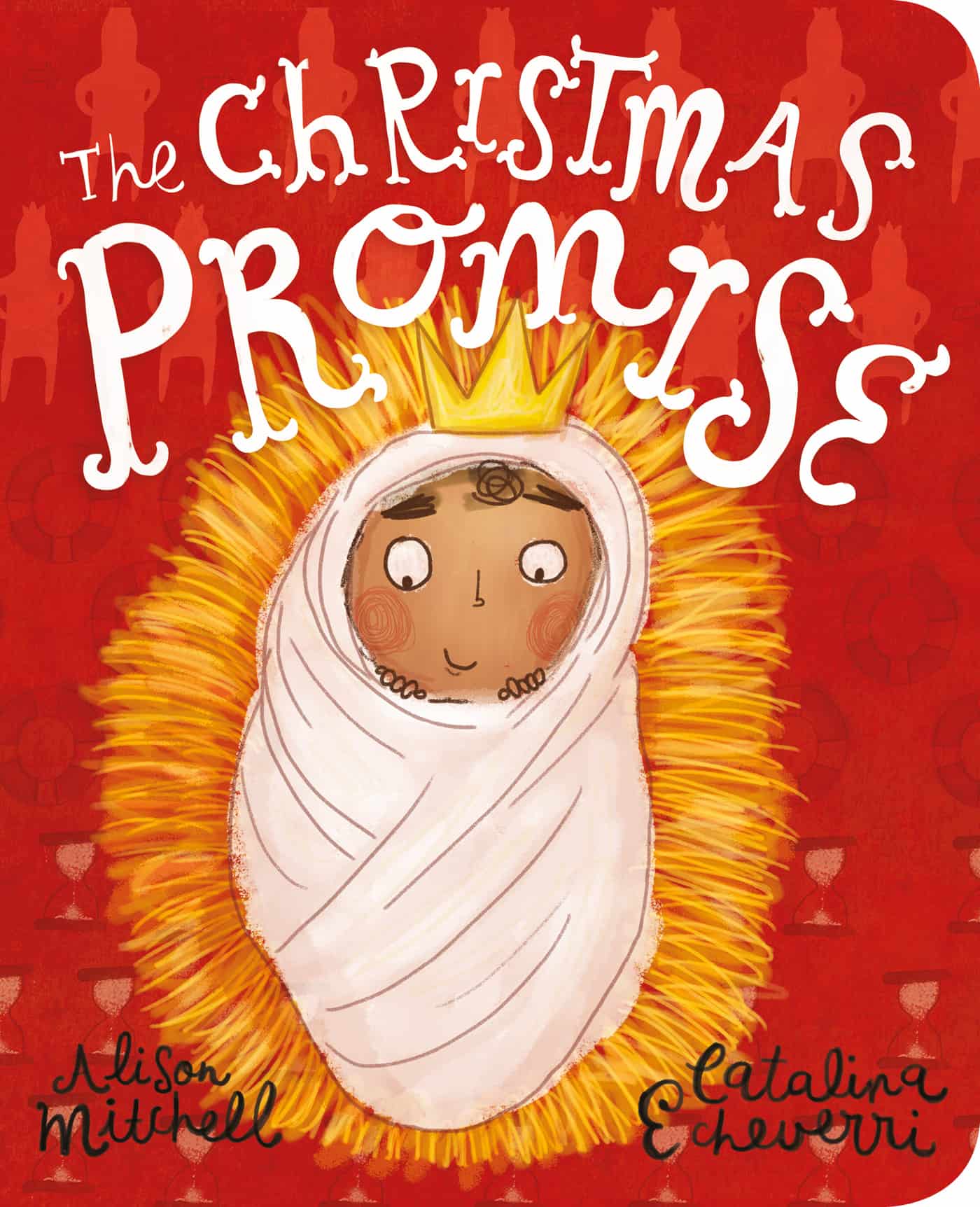
A captivating retelling of the Christmas story for children aged 2-4, showing how God kept His promise to send a new King. Superb illustrations by Catalina Echeverri and faithful, Bible-centred story-telling by Alison Mitchell combine to make this a book that both parents and children will love.
Using simple sentences and stunning illustrations, this 16-page board book introduces young children to the events of the very first Christmas.
Follow The Good Book Company on Facebook and Twitter for a chance to keep up with their blog, latest news, new releases, monthly giveaways and more.
Enter Here
Again, there are five packages to win. And all you need to do to enter the draw is to drop your name and email address in the form below.
Giveaway Rules: You may enter one time. As soon as the winners have been chosen, all names and addresses will be immediately and permanently erased. Winners will be notified by email. The giveaway closes Saturday at noon. If you are viewing this through email, click to visit my site and enter there.
]]> Today’s Kindle deals include a kind of grab bag that includes all sorts of different books. You may be interested in this new album by Cardiphonia which explores the whole of Psalm 119 in 22 songs. (Yesterday on the blog: How To Discover and Deploy Your Gifts) What Does 2 John Have to Teach Us about Partnering with False Teachers? “It’s quite common for ostensibly evangelical pastors, teachers, and authors to share ministry platforms with those who preach a gospel other than that which was “once for all delivered to the saints” (Jude 3). Many evangelicals find this pattern of association to be dangerous, damaging, and confusing. They argue that it’s not only unwise to share public ministry platforms with false teachers, but that it is in fact sin. Are these critics correct, or are they overreacting? Thankfully, we don’t have to try and use our own wisdom to try and untie this knot. Scripture speaks plainly and clearly on the matter.” The Truth about Ancestral Worship You can read, watch, or listen to this rather interesting discussion on African ancestral worship from TGC Africa. Free Ebook: Awe by Paul David Tripp (SPONSORED LINK) Humans are hardwired for awe. Whether it’s the Grand Canyon, a beautiful work of art, or the birth of a baby, we love to be amazed. But there’s something—or Someone, rather—who surpasses all others: God himself. Helping us kindle an ever-growing passion for God’s glory, Awe: Why It Matters for Everything We Think, Say, and Do, by Paul David Tripp reminds…]]>
Today’s Kindle deals include a kind of grab bag that includes all sorts of different books. You may be interested in this new album by Cardiphonia which explores the whole of Psalm 119 in 22 songs. (Yesterday on the blog: How To Discover and Deploy Your Gifts) What Does 2 John Have to Teach Us about Partnering with False Teachers? “It’s quite common for ostensibly evangelical pastors, teachers, and authors to share ministry platforms with those who preach a gospel other than that which was “once for all delivered to the saints” (Jude 3). Many evangelicals find this pattern of association to be dangerous, damaging, and confusing. They argue that it’s not only unwise to share public ministry platforms with false teachers, but that it is in fact sin. Are these critics correct, or are they overreacting? Thankfully, we don’t have to try and use our own wisdom to try and untie this knot. Scripture speaks plainly and clearly on the matter.” The Truth about Ancestral Worship You can read, watch, or listen to this rather interesting discussion on African ancestral worship from TGC Africa. Free Ebook: Awe by Paul David Tripp (SPONSORED LINK) Humans are hardwired for awe. Whether it’s the Grand Canyon, a beautiful work of art, or the birth of a baby, we love to be amazed. But there’s something—or Someone, rather—who surpasses all others: God himself. Helping us kindle an ever-growing passion for God’s glory, Awe: Why It Matters for Everything We Think, Say, and Do, by Paul David Tripp reminds…]]>
Today’s Kindle deals include a kind of grab bag that includes all sorts of different books.
You may be interested in this new album by Cardiphonia which explores the whole of Psalm 119 in 22 songs.
(Yesterday on the blog: How To Discover and Deploy Your Gifts)
What Does 2 John Have to Teach Us about Partnering with False Teachers?
“It’s quite common for ostensibly evangelical pastors, teachers, and authors to share ministry platforms with those who preach a gospel other than that which was “once for all delivered to the saints” (Jude 3). Many evangelicals find this pattern of association to be dangerous, damaging, and confusing. They argue that it’s not only unwise to share public ministry platforms with false teachers, but that it is in fact sin. Are these critics correct, or are they overreacting? Thankfully, we don’t have to try and use our own wisdom to try and untie this knot. Scripture speaks plainly and clearly on the matter.”
The Truth about Ancestral Worship
You can read, watch, or listen to this rather interesting discussion on African ancestral worship from TGC Africa.
Free Ebook: Awe by Paul David Tripp (SPONSORED LINK)
Humans are hardwired for awe. Whether it’s the Grand Canyon, a beautiful work of art, or the birth of a baby, we love to be amazed. But there’s something—or Someone, rather—who surpasses all others: God himself. Helping us kindle an ever-growing passion for God’s glory, Awe: Why It Matters for Everything We Think, Say, and Do, by Paul David Tripp reminds us of the role awe plays in shaping everything we choose, decide, think, desire, say, and do. Reflecting on how awe for God impacts our approach to spiritual warfare, ministry, material things, and more, Tripp will energize your love for God by opening your eyes afresh to the glory of his love, grace, and power.
Enneagram Rhapsody (Video)
This is pretty silly, but they at least did it well! (Also, I don’t at all care for the enneagram, so save your hate mail!)
Every Movie Cliché We Have About Teenage Dating Is Basically Wrong
This article has some interesting things to say about how teenage dating is not how the movies make it. “Kids who don’t date in high school are less depressed, more together and generally more set up for success than the popular kids in every respect. So how did we get it all backwards for so long?”
9 Things You Should Know About Global Poverty
Joe Carter provides 9 things you should know about global poverty.
God Is on His Throne, Everything Is Going His Way, and He Loves Me
“I had a friend who used to answer a common question in an uncommon way. He has since moved to another city, but his response has never left me. For a long time, when I would ask how he was, he gave a three-fold response…”
Flashback: What the Bible Says About Anger
I suppose it should come as no surprise that the Bible has a great deal to say about anger. Anger is, after all, not only a result of sin but also a common cause of sin.
]]> This week the blog is sponsored by Dwell and written by Jeff McFadden. As I write this it’s mid-July, which means that, for many of us, it’s been 5 or 6 months since we fell off the wagon of the annual I’m-going-to-read-the-Bible-in-a-year train. The new year’s hope and optimism was knocked aside in the busyness of spring, and what summer offers in the way of time feels sapped away by heat and travel. One of the constant struggles of my life has been reading God’s word regularly. I’ve had some great runs, but even in the midst of those, I’ve found myself falling into the trap of treating Bible reading as a kind of “Christian Chore” rather than an act of getting to know (and become known by) the God of the universe. After enough forced-morning-skimming sessions it’s easy to throw up your hands and wonder why you’re even bothering to jump through your own legalistic hoops. And yet, the Bible answers back to us the importance of knowing God’s word, “that you may have certainty concerning the things you have been taught.” (Luke 1:4, ESV), “that they know you the only true God, and Jesus Christ whom you have sent.” (John 17:3, ESV), and “for teaching, for reproof, for correction, and for training in righteousness, that the man of God may be competent, equipped for every good work.” (2 Timothy 3:16-17). As David Mathis says, “The one who created us—and sustains us moment by moment (Col. 1:17; Heb. 1:3)—has expressed himself to us in…]]>
This week the blog is sponsored by Dwell and written by Jeff McFadden. As I write this it’s mid-July, which means that, for many of us, it’s been 5 or 6 months since we fell off the wagon of the annual I’m-going-to-read-the-Bible-in-a-year train. The new year’s hope and optimism was knocked aside in the busyness of spring, and what summer offers in the way of time feels sapped away by heat and travel. One of the constant struggles of my life has been reading God’s word regularly. I’ve had some great runs, but even in the midst of those, I’ve found myself falling into the trap of treating Bible reading as a kind of “Christian Chore” rather than an act of getting to know (and become known by) the God of the universe. After enough forced-morning-skimming sessions it’s easy to throw up your hands and wonder why you’re even bothering to jump through your own legalistic hoops. And yet, the Bible answers back to us the importance of knowing God’s word, “that you may have certainty concerning the things you have been taught.” (Luke 1:4, ESV), “that they know you the only true God, and Jesus Christ whom you have sent.” (John 17:3, ESV), and “for teaching, for reproof, for correction, and for training in righteousness, that the man of God may be competent, equipped for every good work.” (2 Timothy 3:16-17). As David Mathis says, “The one who created us—and sustains us moment by moment (Col. 1:17; Heb. 1:3)—has expressed himself to us in…]]>
This week the blog is sponsored by Dwell and written by Jeff McFadden.
As I write this it’s mid-July, which means that, for many of us, it’s been 5 or 6 months since we fell off the wagon of the annual I’m-going-to-read-the-Bible-in-a-year train. The new year’s hope and optimism was knocked aside in the busyness of spring, and what summer offers in the way of time feels sapped away by heat and travel.
One of the constant struggles of my life has been reading God’s word regularly. I’ve had some great runs, but even in the midst of those, I’ve found myself falling into the trap of treating Bible reading as a kind of “Christian Chore” rather than an act of getting to know (and become known by) the God of the universe. After enough forced-morning-skimming sessions it’s easy to throw up your hands and wonder why you’re even bothering to jump through your own legalistic hoops.
And yet, the Bible answers back to us the importance of knowing God’s word, “that you may have certainty concerning the things you have been taught.” (Luke 1:4, ESV), “that they know you the only true God, and Jesus Christ whom you have sent.” (John 17:3, ESV), and “for teaching, for reproof, for correction, and for training in righteousness, that the man of God may be competent, equipped for every good work.” (2 Timothy 3:16-17).
As David Mathis says, “The one who created us—and sustains us moment by moment (Col. 1:17; Heb. 1:3)—has expressed himself to us in human words, and it is vital that we listen.” (Hear His Voice, emphasis mine).
For millennia the primary way that God’s people heard his voice was by listening to someone else speaking it — the world literacy rate didn’t cross 50% until 1950. Having a personal Bible in your home, and being able to read it, is an astonishingly new experience. And while the grace of having God’s word accessible to us on our bedside should not be understated, it’s worth asking ourselves if we’re truly experiencing God’s word to the fullest if our only experience with it is reading it at the kitchen table.
Listening is a dramatically different experience than reading. It activates different parts of our brains, helping us form new and different connections, and pulls on different parts of our heart. In a very practical way, it brings a freshness to scripture by changing the typical tone and pace that we’re accustomed to as we read. That freshness helps us stay engaged, especially when the recording quality is high, as in an app like Dwell.
While simply listening to stories we’re familiar with can give us a new perspective, listening has other advantages. When paired with the ability to repeat content quickly, listening becomes a powerful tool for memorization (Psalm 119). And when that repetition is slowed down it becomes a powerful tool for meditation and reflection (Psalm 1).
And, frankly, there are just some seasons in life when listening to God’s word on the way to work (or while doing chores, or exercising) is the only way we’re going to hear it at all.
If you’ve never tried a Bible listening app like Dwell, download it today and give it a try. Start a listening plan and work through a book of the Bible on your drive to work. Listen to a few stories you’re familiar with and see what jumps out at you. What’s been there the whole time that you’ve unintentionally skimmed over? Then, turn on Dwell Mode (the app’s repeat feature), slow down and experience the richness of meditation and reflection.
Don’t give in to the Christian Chores mentality of Bible reading. Pick up Dwell, start listening, and “Let the word of Christ dwell in you richly” (Colossians 3:16a, ESV).
Try out Dwell today and start transforming the way you experience Scripture…by having it read over you.
]]> It’s that time again! I couldn’t possibly read or review every good book (not to mention every bad book) that finds its way into my mailbox. However, I do like to look them all over and let my readers know about some of the new ones that are most noteworthy. So here are the new and notable books that appeared in my mailbox over the last month or so. In each case, I’ve included the publisher’s description to give you a sense of what it’s all about. You’ll find a good mix here—some for kids, some for teens, and some for everyone else. Alongside: Loving Teenagers with the Gospel by Drew Hill. “Alongside is a much-needed resource for both parents and those in youth ministry. In this transformative book, Drew Hill unpacks the challenges teenagers face and how youth leaders and parents can share the gospel with them at this crucial age. Full of practical insight and biblical knowledge, Alongside is an invitation to love teenagers well with the hope of the gospel. Our teenage friends are full of questions and longings. They re trying to figure out who they are, where they belong, and if they matter during this pivotal time of development all while facing new realities of loneliness and isolation, despite their social media followers. Teenagers want to be chased, and Alongside brings Scripture to life and helps parents and those in youth ministry practically connect the life of Jesus to the lives of their adolescent children and friends.” (buy it at…]]>
It’s that time again! I couldn’t possibly read or review every good book (not to mention every bad book) that finds its way into my mailbox. However, I do like to look them all over and let my readers know about some of the new ones that are most noteworthy. So here are the new and notable books that appeared in my mailbox over the last month or so. In each case, I’ve included the publisher’s description to give you a sense of what it’s all about. You’ll find a good mix here—some for kids, some for teens, and some for everyone else. Alongside: Loving Teenagers with the Gospel by Drew Hill. “Alongside is a much-needed resource for both parents and those in youth ministry. In this transformative book, Drew Hill unpacks the challenges teenagers face and how youth leaders and parents can share the gospel with them at this crucial age. Full of practical insight and biblical knowledge, Alongside is an invitation to love teenagers well with the hope of the gospel. Our teenage friends are full of questions and longings. They re trying to figure out who they are, where they belong, and if they matter during this pivotal time of development all while facing new realities of loneliness and isolation, despite their social media followers. Teenagers want to be chased, and Alongside brings Scripture to life and helps parents and those in youth ministry practically connect the life of Jesus to the lives of their adolescent children and friends.” (buy it at…]]>
It’s that time again! I couldn’t possibly read or review every good book (not to mention every bad book) that finds its way into my mailbox. However, I do like to look them all over and let my readers know about some of the new ones that are most noteworthy. So here are the new and notable books that appeared in my mailbox over the last month or so. In each case, I’ve included the publisher’s description to give you a sense of what it’s all about. You’ll find a good mix here—some for kids, some for teens, and some for everyone else.
 Alongside: Loving Teenagers with the Gospel by Drew Hill. “Alongside is a much-needed resource for both parents and those in youth ministry. In this transformative book, Drew Hill unpacks the challenges teenagers face and how youth leaders and parents can share the gospel with them at this crucial age. Full of practical insight and biblical knowledge, Alongside is an invitation to love teenagers well with the hope of the gospel. Our teenage friends are full of questions and longings. They re trying to figure out who they are, where they belong, and if they matter during this pivotal time of development all while facing new realities of loneliness and isolation, despite their social media followers. Teenagers want to be chased, and Alongside brings Scripture to life and helps parents and those in youth ministry practically connect the life of Jesus to the lives of their adolescent children and friends.” (buy it at Amazon or Westminster Books)
Alongside: Loving Teenagers with the Gospel by Drew Hill. “Alongside is a much-needed resource for both parents and those in youth ministry. In this transformative book, Drew Hill unpacks the challenges teenagers face and how youth leaders and parents can share the gospel with them at this crucial age. Full of practical insight and biblical knowledge, Alongside is an invitation to love teenagers well with the hope of the gospel. Our teenage friends are full of questions and longings. They re trying to figure out who they are, where they belong, and if they matter during this pivotal time of development all while facing new realities of loneliness and isolation, despite their social media followers. Teenagers want to be chased, and Alongside brings Scripture to life and helps parents and those in youth ministry practically connect the life of Jesus to the lives of their adolescent children and friends.” (buy it at Amazon or Westminster Books)
 The Path of Life: Blessedness in Seasons of Lament by Stephen Yuille. “Psalm 119 is noted for its call to delight in the word of God. But we must not fail to realize that this great psalm is also infused with great lament. In “The Path of Life”, J. Stephen Yuille follows the psalmist through his many ups and downs in order to see how he gives voice to the song in our soul. Here is comfort for bearing sorrow, strength for enduring difficulty, trust for facing uncertainty, and peace for overcoming anxiety. Even in his extremity, the psalmist finds joy in the blessed God. This is how Jesus persevered through trials and endured the cross. And in Christ, you too can take up this psalm, follow the path of life, and find blessedness in your seasons of lament.” (buy it at Amazon)
The Path of Life: Blessedness in Seasons of Lament by Stephen Yuille. “Psalm 119 is noted for its call to delight in the word of God. But we must not fail to realize that this great psalm is also infused with great lament. In “The Path of Life”, J. Stephen Yuille follows the psalmist through his many ups and downs in order to see how he gives voice to the song in our soul. Here is comfort for bearing sorrow, strength for enduring difficulty, trust for facing uncertainty, and peace for overcoming anxiety. Even in his extremity, the psalmist finds joy in the blessed God. This is how Jesus persevered through trials and endured the cross. And in Christ, you too can take up this psalm, follow the path of life, and find blessedness in your seasons of lament.” (buy it at Amazon)
 Final Word: Why We Need the Bible by John MacArthur. “The Bible is under attack on all sides. Unbelievers denounce it as backward, narrow-minded, and intolerant, and even some professing Christians deny its truth to gain approval from the culture. With each assault, we hear echoes of the serpent’s question in the garden of Eden: ‘Did God really say?’ Unfortunately, many believers don’t know how to answer these challenges and find their confidence in God’s Word shaken. In Final Word: Why We Need the Bible, Dr. John MacArthur defends the trustworthiness of Scripture, with the goal of equipping the church to stand firm for the truth even when others abandon it. Only when God’s people recognize the Bible for what it is—God’s inerrant, authoritative Word—will they be able to fulfill their calling and carry the message of God’s salvation to the world.” (buy it at Amazon or Westminster Books)
Final Word: Why We Need the Bible by John MacArthur. “The Bible is under attack on all sides. Unbelievers denounce it as backward, narrow-minded, and intolerant, and even some professing Christians deny its truth to gain approval from the culture. With each assault, we hear echoes of the serpent’s question in the garden of Eden: ‘Did God really say?’ Unfortunately, many believers don’t know how to answer these challenges and find their confidence in God’s Word shaken. In Final Word: Why We Need the Bible, Dr. John MacArthur defends the trustworthiness of Scripture, with the goal of equipping the church to stand firm for the truth even when others abandon it. Only when God’s people recognize the Bible for what it is—God’s inerrant, authoritative Word—will they be able to fulfill their calling and carry the message of God’s salvation to the world.” (buy it at Amazon or Westminster Books)
 Between Us Guys: Life-Changing Conversations for Dads and Sons By Joel Fitzpatrick. “This easy-to-use, life-changing book for fathers and sons gives readers the tools to have important conversations with boys about life, faith, and being a man. With a conversational and captivating tone, fathers and other caregivers are guided into having gospel-focused conversations with boys about a wide range of topics from social justice and friendships to money, anger, and what it means to be a man. Dads are given an incredible opportunity to be one of the primary influences in their children’s lives for the gospel. By inviting conversations in every arena of life, fathers pass down the message of Christ to the next generation. As a youth and family pastor and father to a young boy who’s entered into many of these conversations, Joel Fitzpatrick knows it’s important not to shy away from difficult subjects.” (buy it at Amazon or Westminster Books)
Between Us Guys: Life-Changing Conversations for Dads and Sons By Joel Fitzpatrick. “This easy-to-use, life-changing book for fathers and sons gives readers the tools to have important conversations with boys about life, faith, and being a man. With a conversational and captivating tone, fathers and other caregivers are guided into having gospel-focused conversations with boys about a wide range of topics from social justice and friendships to money, anger, and what it means to be a man. Dads are given an incredible opportunity to be one of the primary influences in their children’s lives for the gospel. By inviting conversations in every arena of life, fathers pass down the message of Christ to the next generation. As a youth and family pastor and father to a young boy who’s entered into many of these conversations, Joel Fitzpatrick knows it’s important not to shy away from difficult subjects.” (buy it at Amazon or Westminster Books)
 Pressure Points: A Guide to Navigating Student Stress by Shelby Abbott. “This humorous, poignant, and conversational guide invites young men and women to practically apply gospel solutions to all of lifes pressures, big or small. From navigating failure, roadblocks, and spiritual warfare to tackling relevant, hard-hitting topics such as drinking, sex, dating, pornography, and the fear of missing out, Pressure Points by Shelby Abbott encourages college students to consider Jesus in the midst of everyday struggles. With twenty years of experience in college ministry, Shelby Abbott is keenly aware of the pressures young men and women face. Used for biblical reflection, group discussion, devotional reading, or large group Bible study discussion, Pressure Points is full of rich gospel hope for all readers. This flexible resource points to Scripture and Abbotts funny, easily digestible reflections to help modern-day college students maneuver their early years toward the gospel, challenging young adults to see their struggles through a biblical lens. By addressing relevant challenges and practical hardships with gospel advice, Pressure Points guides readers to see and lean on the person of Jesus, reflecting on important issues in light of the gospel.” (buy it at Amazon or Westminster Books)
Pressure Points: A Guide to Navigating Student Stress by Shelby Abbott. “This humorous, poignant, and conversational guide invites young men and women to practically apply gospel solutions to all of lifes pressures, big or small. From navigating failure, roadblocks, and spiritual warfare to tackling relevant, hard-hitting topics such as drinking, sex, dating, pornography, and the fear of missing out, Pressure Points by Shelby Abbott encourages college students to consider Jesus in the midst of everyday struggles. With twenty years of experience in college ministry, Shelby Abbott is keenly aware of the pressures young men and women face. Used for biblical reflection, group discussion, devotional reading, or large group Bible study discussion, Pressure Points is full of rich gospel hope for all readers. This flexible resource points to Scripture and Abbotts funny, easily digestible reflections to help modern-day college students maneuver their early years toward the gospel, challenging young adults to see their struggles through a biblical lens. By addressing relevant challenges and practical hardships with gospel advice, Pressure Points guides readers to see and lean on the person of Jesus, reflecting on important issues in light of the gospel.” (buy it at Amazon or Westminster Books)
 Growing in Godliness: A Teen Girl’s Guide to Maturing in Christ by Lindsey Carlson. “Of all the ways you’re learning and changing during the busy teenage years, your growth in Christ is the most important. God intends to use your teen years as a launching pad into a lifelong pursuit of looking more like Jesus. This book will help you prioritize your Christian growth—pointing you to the resources God has given you in his Word, in prayer, and in the church; offering help for managing your emotions, watching your words, and bearing spiritual fruit; and challenging you with ways to center your life around this important task. Even as a teenager, you have all it takes to grow in godliness.” (buy it at Amazon or Westminster Books)
Growing in Godliness: A Teen Girl’s Guide to Maturing in Christ by Lindsey Carlson. “Of all the ways you’re learning and changing during the busy teenage years, your growth in Christ is the most important. God intends to use your teen years as a launching pad into a lifelong pursuit of looking more like Jesus. This book will help you prioritize your Christian growth—pointing you to the resources God has given you in his Word, in prayer, and in the church; offering help for managing your emotions, watching your words, and bearing spiritual fruit; and challenging you with ways to center your life around this important task. Even as a teenager, you have all it takes to grow in godliness.” (buy it at Amazon or Westminster Books)
 Talk the Walk: How to Be Right Without Being Insufferable by Steve Brown. “This attitude-altering book invites Christians to cultivate boldness and humility in communicating gospel truth. By uncovering self-righteousness and spiritual arrogance, Talk the Walk by pastor and author Steve Brown shatters stereotypes and helps believers consider how they present the good news without watering it down. The Christian faith is true, and while we may be right on issues of salvation and theology, we may miss the less articulated truths of humility, love, and forgiveness. We live in a culture that is increasingly hostile to Christians and their faith. Talk the Walk unpacks the call to go out into the world and share faith by being truthful and winsome. By helping men and women love others out of a deeper love in Christ the one who first loved us Talk the Walk helps Christians present the gospel clearly and with compassion. Take a step back and look at others perceptions. Explore the tools necessary to accomplish an attitude change of confidence and humility, repentance and truth. Share the message of Christ without distorting it. Speak confidently without being cold. By operating out of humble gratitude for the gospel, begin to talk the walk of Christian faith, reflecting the love and truth of Jesus.” (buy it at Amazon)
Talk the Walk: How to Be Right Without Being Insufferable by Steve Brown. “This attitude-altering book invites Christians to cultivate boldness and humility in communicating gospel truth. By uncovering self-righteousness and spiritual arrogance, Talk the Walk by pastor and author Steve Brown shatters stereotypes and helps believers consider how they present the good news without watering it down. The Christian faith is true, and while we may be right on issues of salvation and theology, we may miss the less articulated truths of humility, love, and forgiveness. We live in a culture that is increasingly hostile to Christians and their faith. Talk the Walk unpacks the call to go out into the world and share faith by being truthful and winsome. By helping men and women love others out of a deeper love in Christ the one who first loved us Talk the Walk helps Christians present the gospel clearly and with compassion. Take a step back and look at others perceptions. Explore the tools necessary to accomplish an attitude change of confidence and humility, repentance and truth. Share the message of Christ without distorting it. Speak confidently without being cold. By operating out of humble gratitude for the gospel, begin to talk the walk of Christian faith, reflecting the love and truth of Jesus.” (buy it at Amazon)
 Don’t Blame the Mud: Only Jesus Makes Us Clean by Marty Machowski. “One day, Max takes the muddy path along the creek home, disregarding his mothers reminder to keep his school clothes clean. After crashing into a mud puddle, he tries to hide his mistake and discovers the stain of his sin goes deeper than the mud he can wash away. In this lovable, relatable, and heartwarming tale, Max learns his heart needs to be cleaned, and Jesus is the only one who can wash away his sin. By clearly articulating the gospel, Don’t Blame the Mud helps parents create an environment of confession so kids can own up to their own mistakesin the freedom of Christrather than place the blame elsewhere. Parents, teachers, and caretakers can help children identify with the real-life draw of temptation and the real-life consequences of sin, understanding the value of Gods salvation through the cross. Instead of teaching kids how to deal with a problem, Machowski uncovers the real issue of sin and provides a gospel answer.” (Buy it from Amazon).
Don’t Blame the Mud: Only Jesus Makes Us Clean by Marty Machowski. “One day, Max takes the muddy path along the creek home, disregarding his mothers reminder to keep his school clothes clean. After crashing into a mud puddle, he tries to hide his mistake and discovers the stain of his sin goes deeper than the mud he can wash away. In this lovable, relatable, and heartwarming tale, Max learns his heart needs to be cleaned, and Jesus is the only one who can wash away his sin. By clearly articulating the gospel, Don’t Blame the Mud helps parents create an environment of confession so kids can own up to their own mistakesin the freedom of Christrather than place the blame elsewhere. Parents, teachers, and caretakers can help children identify with the real-life draw of temptation and the real-life consequences of sin, understanding the value of Gods salvation through the cross. Instead of teaching kids how to deal with a problem, Machowski uncovers the real issue of sin and provides a gospel answer.” (Buy it from Amazon).
 This week’s Free Stuff Friday is sponsored by Reformation Heritage Books who also sponsored the blog this week. They have 5 packages of Book packages, which means 5 winners will each receive the following titles: Puritan Heroes – Glenda Mathes and Joel Beeke “They remind us of our calling to be disciples. They encourage us to press on through trials and suffering. They remind us to be joyful and grateful for all that God has done. Above all, they remind us to keep our eyes fixed on the one Hero, our faithful Lord, and Savior.” —Stephen J. Nichols Who were the Puritans, and why are they important? What can we learn from them today? The Puritan movement began in England during the sixteenth century and continued all the way into the early eighteenth century. Although the Church of England was formed as a result of the Reformation, the Puritans believed it needed much more reform. Puritan Heroes is a beautifully illustrated book that gives the reader an idea of what the Puritan movement was about and offers a glimpse into the lives of more than twenty of its most well-known leaders (among them William Perkins, Richard Sibbes, Thomas Goodwin, Anne Bradstreet, and Jonathan Edwards). The book concludes with ten important lessons readers can learn from the Puritans and study questions to help them retain these fascinating stories and assist them in applying the lessons to their lives. It also features a bibliography to encourage further study in greater depth, as well as a glossary and…]]>
This week’s Free Stuff Friday is sponsored by Reformation Heritage Books who also sponsored the blog this week. They have 5 packages of Book packages, which means 5 winners will each receive the following titles: Puritan Heroes – Glenda Mathes and Joel Beeke “They remind us of our calling to be disciples. They encourage us to press on through trials and suffering. They remind us to be joyful and grateful for all that God has done. Above all, they remind us to keep our eyes fixed on the one Hero, our faithful Lord, and Savior.” —Stephen J. Nichols Who were the Puritans, and why are they important? What can we learn from them today? The Puritan movement began in England during the sixteenth century and continued all the way into the early eighteenth century. Although the Church of England was formed as a result of the Reformation, the Puritans believed it needed much more reform. Puritan Heroes is a beautifully illustrated book that gives the reader an idea of what the Puritan movement was about and offers a glimpse into the lives of more than twenty of its most well-known leaders (among them William Perkins, Richard Sibbes, Thomas Goodwin, Anne Bradstreet, and Jonathan Edwards). The book concludes with ten important lessons readers can learn from the Puritans and study questions to help them retain these fascinating stories and assist them in applying the lessons to their lives. It also features a bibliography to encourage further study in greater depth, as well as a glossary and…]]>
This week’s Free Stuff Friday is sponsored by Reformation Heritage Books who also sponsored the blog this week. They have 5 packages of Book packages, which means 5 winners will each receive the following titles:
Puritan Heroes – Glenda Mathes and Joel Beeke
“They remind us of our calling to be disciples. They encourage us to press on through trials and suffering. They remind us to be joyful and grateful for all that God has done. Above all, they remind us to keep our eyes fixed on the one Hero, our faithful Lord, and Savior.” —Stephen J. Nichols
Who were the Puritans, and why are they important? What can we learn from them today? The Puritan movement began in England during the sixteenth century and continued all the way into the early eighteenth century. Although the Church of England was formed as a result of the Reformation, the Puritans believed it needed much more reform. Puritan Heroes is a beautifully illustrated book that gives the reader an idea of what the Puritan movement was about and offers a glimpse into the lives of more than twenty of its most well-known leaders (among them William Perkins, Richard Sibbes, Thomas Goodwin, Anne Bradstreet, and Jonathan Edwards). The book concludes with ten important lessons readers can learn from the Puritans and study questions to help them retain these fascinating stories and assist them in applying the lessons to their lives. It also features a bibliography to encourage further study in greater depth, as well as a glossary and timeline to help readers understand the historical context. Written for children and young people, it will prove a suitable introduction to the Puritans for adults as well.
The Collected Prayers of John Knox – Brian Najapfour
“Here for the first time in a single volume are the extant prayers composed by the sixteenth-century Scottish Reformer John Knox. The outward circumstances of their origin reflect a lifetime of tumultuous events and the ardent struggle for the advance of Christ’s kingdom in the face of entrenched political and ecclesiastical opposition. Similarly, their inward springs disclose a spirit steeped in the lamentation and confession of sin, hope for mercy, and confident trust in the providence of God that are characteristic of the Psalms, and a heart fixed on the perfect priesthood, sacrifice, and prevailing intercession of the Lord Jesus. Prayers that originally appeared in settings as diverse as Knox’s History of the Reformation of Religion in Scotland, his letters to beleaguered congregations, or his manuals of worship are here conveniently arranged in a classification according to their theme and their suitable occasions.” —R. Sherman Isbell
A Certain Sound: A Primer on Open Air Preaching – Ryan Denton and Scott Smith
“Read this book. Master it. And with the help of the Holy Spirit, let the ‘certain sound’ of the glorious gospel of Christ be heard outdoors once again.” —Rob Ventura
“Without question, there is a resurgence of open-air preaching in the United States. I, for one, welcome it, but I know many others in the Reformed and evangelical church world are highly skeptical. I too have observed many who have given open-air preaching a bad name and brought disrepute on the practice. For this reason, I have for some time wished someone would write an apologetic for open-air preaching, and I believe we now have such an important book in A Certain Sound: A Primer on Open Air Preaching.
“The authors are seasoned open-air preachers with whom I have preached several times in the streets of America. They are passionate, Reformed, and Christ-centered in their preaching. I urge pastors, evangelists, and laypeople to read this book, and hopefully, God will use it to lend credibility to the practice and to inspire churches everywhere to get behind open-air preaching.” —Al Baker
The Future of Everything: Essential Truths about the End Times – William Boekestein
“A brief simple book on the end times? Is this possible? You have it in your hands, and with just a little effort you can soon have it in your head and heart. It will not only prepare you for the end but also equip you to prepare others for eternity.” —David Murray
All of us think about the end times. When we reflect on what will happen not only when we die but when this present age ends, some combination of ideas, images, hopes, and fears floods our minds. In The Future of Everything, William Boekestein encourages us to allow our thoughts on the end times to be guided by God’s Word. While combing the Scriptures to find direction related to subjects like death, the millennial kingdom, the return of Christ, the resurrection, judgment, heaven, and hell, Boekestein helps us cultivate a vision for the future that impacts our walk before God’s face today.
The Path of Life – Stephen Yuille
“The psalms of lamentation, as Yuille reminds us, give Christians a much-needed theology of suffering through which to see our sovereign God working all things, even our suffering, toward our good and for His glory.” —R. Albert Mohler Jr.
Psalm 119 is noted for its call to delight in the word of God. But we must not fail to realize that this great psalm is also infused with great lament. In The Path of Life, J. Stephen Yuille follows the psalmist through his many ups and downs in order to see how he gives voice to the song in our soul. Here is a comfort for bearing sorrow, strength for enduring difficulty, trust for facing uncertainty, and peace for overcoming anxiety. Even in his extremity, the psalmist finds joy in the blessed God. This is how Jesus persevered through trials and endured the cross. And in Christ, you too can take up this psalm, follow the path of life, and find blessedness in your seasons of lament.
Enter Here
Again, there are five packages to win. And all you need to do to enter the draw is to drop your name and email address in the form below.
Giveaway Rules: You may enter one time. As soon as the winners have been chosen, all names and addresses will be immediately and permanently erased. Winners will be notified by email. The giveaway closes Saturday at noon. If you are viewing this through email, click to visit my site and enter there.
]]> Earlier in the week, eager to be encouraged, I put this question out to Twitter: What has the Lord been teaching you from his Word recently? The responses were quick, plentiful, and encouraging. Here are a few of them. (Click here to read them all.) I’ve been meditating on the Good Samaritan, and I’m learning that loving our enemies isn’t merely the same as not “repaying evil for evil”, it means returning love for evil. It’s been quite convicting. — Samuel Sey (@SlowToWrite) January 10, 2019 Last night, at a prayer meeting, a sister showed me Psalm 50:23 and said “The only way I’ve made it through the toughest times is by thanksgiving and praise. Nothing else sustains the soul like prayers of thanks and praise.” — Spencer DeBurgh (@SpencerDeBurgh) January 10, 2019 Pure undefiled religion is uncomfortable. But I/we need to learn to be comfortable being uncomfortable for the sake of Christ. — Matt Boga (@mattboga) January 10, 2019 Psalm 119 is teaching me the supremacy of Gods Word and circumstances are exposing my own need for grace! — Luke Schmeltzer (@schmeltzer1689) January 10, 2019 I need to focus more on the log in my eye than the speck in someone else’s. — Lynn Trigg (@LynnTrigg1) January 10, 2019 From Jacob’s life in the OT & 1 Peter in the NT that some of the suffering we endure is neither discipline/punishment nor persecution. Some suffering is simply uncomfortable labor I cannot connect to one of the other of those two sources of suffering. It’s…]]>
Earlier in the week, eager to be encouraged, I put this question out to Twitter: What has the Lord been teaching you from his Word recently? The responses were quick, plentiful, and encouraging. Here are a few of them. (Click here to read them all.) I’ve been meditating on the Good Samaritan, and I’m learning that loving our enemies isn’t merely the same as not “repaying evil for evil”, it means returning love for evil. It’s been quite convicting. — Samuel Sey (@SlowToWrite) January 10, 2019 Last night, at a prayer meeting, a sister showed me Psalm 50:23 and said “The only way I’ve made it through the toughest times is by thanksgiving and praise. Nothing else sustains the soul like prayers of thanks and praise.” — Spencer DeBurgh (@SpencerDeBurgh) January 10, 2019 Pure undefiled religion is uncomfortable. But I/we need to learn to be comfortable being uncomfortable for the sake of Christ. — Matt Boga (@mattboga) January 10, 2019 Psalm 119 is teaching me the supremacy of Gods Word and circumstances are exposing my own need for grace! — Luke Schmeltzer (@schmeltzer1689) January 10, 2019 I need to focus more on the log in my eye than the speck in someone else’s. — Lynn Trigg (@LynnTrigg1) January 10, 2019 From Jacob’s life in the OT & 1 Peter in the NT that some of the suffering we endure is neither discipline/punishment nor persecution. Some suffering is simply uncomfortable labor I cannot connect to one of the other of those two sources of suffering. It’s…]]>
Earlier in the week, eager to be encouraged, I put this question out to Twitter: What has the Lord been teaching you from his Word recently? The responses were quick, plentiful, and encouraging. Here are a few of them. (Click here to read them all.)
I’ve been meditating on the Good Samaritan, and I’m learning that loving our enemies isn’t merely the same as not “repaying evil for evil”, it means returning love for evil. It’s been quite convicting.
— Samuel Sey (@SlowToWrite) January 10, 2019
Last night, at a prayer meeting, a sister showed me Psalm 50:23 and said
“The only way I’ve made it through the toughest times is by thanksgiving and praise. Nothing else sustains the soul like prayers of thanks and praise.”
— Spencer DeBurgh (@SpencerDeBurgh) January 10, 2019
Pure undefiled religion is uncomfortable. But I/we need to learn to be comfortable being uncomfortable for the sake of Christ.
— Matt Boga (@mattboga) January 10, 2019
Psalm 119 is teaching me the supremacy of Gods Word and circumstances are exposing my own need for grace!
— Luke Schmeltzer (@schmeltzer1689) January 10, 2019
I need to focus more on the log in my eye than the speck in someone else’s.
— Lynn Trigg (@LynnTrigg1) January 10, 2019
From Jacob’s life in the OT & 1 Peter in the NT that some of the suffering we endure is neither discipline/punishment nor persecution. Some suffering is simply uncomfortable labor I cannot connect to one of the other of those two sources of suffering. It’s part of living life.
— Brian Onken (@readingtexts) January 10, 2019
That reminding ourselves of the truths of the gospel found in Titus 3:4-7 should cause us to be devoted to the good works God has laid before us, doing them out of love for God and gratitude for what he’s done.
— Brittany Allen (@BritLeeAllen) January 10, 2019
God will fight for me. I need only to be still and trust him.
— Chelsea Stanley (@chelseakstanley) January 10, 2019
The beauty of the doctrine of justification by faith. (I’ve been teaching in Galatians, and it’s been rockin’ my world)
— nατε picκοwicz (@NatePickowicz) January 10, 2019
I started reading through the Bible again, and one truth that becomes apparent almost immediately and continues throughout the narrative is that whether or not we believe God is evidenced by whether or not we obey God.
— Matt Fletcher (@MattFletcher10) January 10, 2019
That we are moved from weeping to rejoicing by singing his rescues (the Exodus, the Cross, The End).
From Habakkuk, especially Hab 3.
— Duncan Hollands (@DuncanHollands) January 10, 2019
That waiting on man to save us is vain and useless, it is only God that triumphs over our enemies. (Psalm 108)
— kimberly (@kimbearable_23) January 11, 2019
That God has consistently called His people to be set-apart and holy, and will continue to until the end (Rev. 18:4). That we are to fully examine our lives and culture in light of that calling.
— Liana (@lianahofer) January 10, 2019
I’m being reminded that assurance is based in Christ.
“Who shall bring any charge against God’s elect? It is God who justifies. Who is to condemn? Christ Jesus is the one who died-more than that, who was raised-who is at the right hand of God, who indeed is interceding for us.”
— Joshua Olson (@joshuaolson9) January 10, 2019
]]>I am full of pride. The most selfless acts are riddled with it. God is so very patient.
— David Tevebaugh (@DavidTevebaugh) January 10, 2019
 It is proving to be an interesting year when it comes to sorting out a possible confluence between Reformed theology and charismatic practice. Over the past few years, as more and more people have embraced the principles of Reformed theology, many have also accepted that the ongoing miraculous gifts of the Holy Spirit remain operative today. However, few have attempted to actually put such doctrine into practice. As the year began I predicted this would soon change, and it seems this is proving true. Most recently, Matt Chandler led his church through an examination of the spiritual gifts as a means of encouraging the congregation to fully practice the full range of gifts. As we consider that possible confluence between two streams of theology that to this point have remained largely separate, a key issue that must be clarified is the relationship of Scripture and prophecy. As Protestants we are convinced that the Bible is the inerrant, infallible, sufficient Word of God. We rightly proclaim the doctrine of Scripture alone (sola scriptura) which assures us that the Bible is our sole authoritative rule for faith and practice. When we introduce prophecy, we must grapple with how to practice it in such a way that it harmonizes with all we believe about the Bible, including sola scriptura. In that vein, this is a question I’ve been eager to find an answer to: What does prophecy offer that Scripture does not? Matt Chandler focused one of his sermons on prophecy and defined the gift as “Spirit-prompted, spontaneous,…]]>
It is proving to be an interesting year when it comes to sorting out a possible confluence between Reformed theology and charismatic practice. Over the past few years, as more and more people have embraced the principles of Reformed theology, many have also accepted that the ongoing miraculous gifts of the Holy Spirit remain operative today. However, few have attempted to actually put such doctrine into practice. As the year began I predicted this would soon change, and it seems this is proving true. Most recently, Matt Chandler led his church through an examination of the spiritual gifts as a means of encouraging the congregation to fully practice the full range of gifts. As we consider that possible confluence between two streams of theology that to this point have remained largely separate, a key issue that must be clarified is the relationship of Scripture and prophecy. As Protestants we are convinced that the Bible is the inerrant, infallible, sufficient Word of God. We rightly proclaim the doctrine of Scripture alone (sola scriptura) which assures us that the Bible is our sole authoritative rule for faith and practice. When we introduce prophecy, we must grapple with how to practice it in such a way that it harmonizes with all we believe about the Bible, including sola scriptura. In that vein, this is a question I’ve been eager to find an answer to: What does prophecy offer that Scripture does not? Matt Chandler focused one of his sermons on prophecy and defined the gift as “Spirit-prompted, spontaneous,…]]>
It is proving to be an interesting year when it comes to sorting out a possible confluence between Reformed theology and charismatic practice. Over the past few years, as more and more people have embraced the principles of Reformed theology, many have also accepted that the ongoing miraculous gifts of the Holy Spirit remain operative today. However, few have attempted to actually put such doctrine into practice. As the year began I predicted this would soon change, and it seems this is proving true. Most recently, Matt Chandler led his church through an examination of the spiritual gifts as a means of encouraging the congregation to fully practice the full range of gifts.
As we consider that possible confluence between two streams of theology that to this point have remained largely separate, a key issue that must be clarified is the relationship of Scripture and prophecy. As Protestants we are convinced that the Bible is the inerrant, infallible, sufficient Word of God. We rightly proclaim the doctrine of Scripture alone (sola scriptura) which assures us that the Bible is our sole authoritative rule for faith and practice. When we introduce prophecy, we must grapple with how to practice it in such a way that it harmonizes with all we believe about the Bible, including sola scriptura. In that vein, this is a question I’ve been eager to find an answer to: What does prophecy offer that Scripture does not?
Matt Chandler focused one of his sermons on prophecy and defined the gift as “Spirit-prompted, spontaneous, intelligible messages orally delivered to a person or community intended for edification and encouragement.” Then, in a number of ways and through a number of anecdotes he indicated what prophecy offers that Scripture does not: prophecy personalizes Scripture. Here’s what he says: “We receive from the Lord a word that doesn’t contradict the Scriptures, doesn’t stand in contrast to the sufficiency of the Scriptures, but it personalizes the Scriptures.” Thus, the prophet speaks on behalf of God to make one or more general biblical truths specific to an individual or community.
That begs an example, and Chandler actually provides several. Most notably, he tells of the days when he was fighting cancer and was in the very worst moments of his illness. He was lying on the bathroom floor and suddenly there flashed through his mind a prophecy a friend had shared with him some time prior: “I will circumcise you, and through that I will make you the father of many sons.” Here is what that did for Chandler: “On the bathroom floor that afternoon, the God of creation bent down and kissed my forehead in the darkest night of my life. … I knew Bible verses for all of that, but I felt seen and loved that day.”
Chandler knew the promises of Scripture as promises from God to his people, but what encouraged and consoled him that day—what made him felt seen and loved by God in his deepest despair—was a word of prophecy. Why? Because the prophet had delivered a personalized word from the Lord to Matt Chandler. He knew the general words of Scripture but craved something more specific and more personal.
As I consider this, I have a number of questions and concerns.
First, Chandler says prophecy personalizes Scripture, but it is not clear what Scriptures this prophet personalized. What is the relationship of this prophecy to the Bible? Was there a specific verse in the background that it personalized (Romans 8:28, perhaps)? Or was this prophecy personalizing general themes in Scripture? It’s clear that this is a personal message, but not at all clear how it relates to existing biblical revelation (and, thus, how it harmonizes with Chandler’s statement of prophecy’s purpose).
Second, it is not clear why this prophecy was more encouraging than the Bible verses Chandler already knew. What does “I will circumcise you, and through that I will make you the father of many sons” offer that “we know that for those who love God all things work together for good, for those who are called according to his purpose” does not? What was it about the first as opposed to the second that came as a kiss from God and made him feel seen and loved? How and why does a possibly fallible prophecy take on a more important role in that moment than clear divine revelation? What benefit is there in receiving a message that is a) vague, b) needing interpretation and c) potentially wrong when we have much better promises that we know are inerrant and infallible?
Third, what Chandler lays out seems to downplay the deeply personal nature of Scripture. I am concerned that his examples of prophecy tacitly teach that the Bible is broad and general in contrast to prophecy which is pointed and specific. We readily admit the Bible is different from every other book in that it is inerrant, infallible, and sufficient. But there is more to the uniqueness of the Bible than that. It is also personal: “For the word of God is living and active, sharper than any two-edged sword, piercing to the division of soul and of spirit, of joints and of marrow, and discerning the thoughts and intentions of the heart.” (Hebrews 4:12). Add to this Jeremiah 23:29, 1 Thessalonians 2:13, Psalm 119, and so many other passages and we must conclude that Scripture is not general communication from God to humanity, but deeply personal communication because it is empowered by the illuminating and applying ministry of the Holy Spirit. Is it the external ministry of prophecy that personalizes Scripture, or is it the internal ministry of the Spirit?
Here’s the question I’ve been asking: What does prophecy offer that Scripture does not? It personalizes the Scriptures, Chandler says. But at the end of it all, I am unconvinced by his answer and examples. I still don’t see how prophecy personalizes the Bible or how it offers anything that is of more value than what we’ve already got.
]]> Welcome to another edition of 3 Minute Thursdays. You know how it works by now: We put three minutes on the clock and in that brief amount of time I do my best to say something helpful, maybe even useful about a subject that’s of interest to people like you. Today I want to talk about church music, and specifically about how to choose music for church. Transcript Welcome to another edition of 3 Minute Thursdays. You know how it works by now. We put three minutes on the clock and in that brief amount of time I do my best to say something helpful, maybe even useful about a subject that’s of interest to people like you. Today I want to talk about music. I want to talk about church music. I want to talk specifically about how to choose music for church, right. Does that sound like a good topic? We’ll get three minutes on the clock and we’ll go for it in just one minute. Today we’re talking music, we’re talking church music. We’re talking about how to choose songs for your church that will be helpful to the congregation. So, we’ll get three minutes on the clock, and let’s do this. The very first thing I want to say is to choose songs that are theologically sound. Now, we have to be careful here. We don’t necessarily mean theologically dense. Not every song has to be absolutely jam-packed with truth. But it does have to be true. Which means it can’t…]]>
Welcome to another edition of 3 Minute Thursdays. You know how it works by now: We put three minutes on the clock and in that brief amount of time I do my best to say something helpful, maybe even useful about a subject that’s of interest to people like you. Today I want to talk about church music, and specifically about how to choose music for church. Transcript Welcome to another edition of 3 Minute Thursdays. You know how it works by now. We put three minutes on the clock and in that brief amount of time I do my best to say something helpful, maybe even useful about a subject that’s of interest to people like you. Today I want to talk about music. I want to talk about church music. I want to talk specifically about how to choose music for church, right. Does that sound like a good topic? We’ll get three minutes on the clock and we’ll go for it in just one minute. Today we’re talking music, we’re talking church music. We’re talking about how to choose songs for your church that will be helpful to the congregation. So, we’ll get three minutes on the clock, and let’s do this. The very first thing I want to say is to choose songs that are theologically sound. Now, we have to be careful here. We don’t necessarily mean theologically dense. Not every song has to be absolutely jam-packed with truth. But it does have to be true. Which means it can’t…]]>
Welcome to another edition of 3 Minute Thursdays. You know how it works by now: We put three minutes on the clock and in that brief amount of time I do my best to say something helpful, maybe even useful about a subject that’s of interest to people like you. Today I want to talk about church music, and specifically about how to choose music for church.
Transcript
Welcome to another edition of 3 Minute Thursdays. You know how it works by now. We put three minutes on the clock and in that brief amount of time I do my best to say something helpful, maybe even useful about a subject that’s of interest to people like you. Today I want to talk about music. I want to talk about church music. I want to talk specifically about how to choose music for church, right. Does that sound like a good topic? We’ll get three minutes on the clock and we’ll go for it in just one minute.
Today we’re talking music, we’re talking church music. We’re talking about how to choose songs for your church that will be helpful to the congregation. So, we’ll get three minutes on the clock, and let’s do this.
The very first thing I want to say is to choose songs that are theologically sound. Now, we have to be careful here. We don’t necessarily mean theologically dense. Not every song has to be absolutely jam-packed with truth. But it does have to be true. Which means it can’t be full of air. So we need to carefully evaluate songs to ensure they are fundamentally true. But there is a place for simple songs. I was just reflecting earlier on Psalm 117, all of two verses. Psalm 118, which is what, 29 verses or something maybe. All the way to Psalm 119, which goes on and on, it’s a huge thing. There’s a psalter, and so back in the day, people were singing those short, all the way to very long songs. And we can learn from that. We can sing short, we can sing long. What matters is the truth. What matters is that they contain sound doctrine.
The second thing is to choose songs that are congregational. What I mean is, there’s songs that are meant to be sung by a group of people. Over the last few years, we’ve really started to choose our songs based on what we hear on Christian radio, or on Christian albums. And that’s not to say those songs are bad or there’s anything wrong with them, but congregational singing really requires congregational songs. So we should really be thinking about songs; are they singable by a group, are they singable by amateur musicians, by people who probably don’t sing for a living, probably don’t know a lot about music. The beauty of hymnody is not just the content of the songs, but it’s the fact that they’re so, so singable. Just about anyone can sing Amazing Grace and pick it up almost immediately. And many of the old hymns are like that. So, let’s go back, as a church, to singing songs that are singable by a group. We don’t have to sing songs that are popular. We don’t have to sing those musical styles. Let’s choose songs that are truly, genuinely singable.
The third principle is to choose songs that have a future. What I mean is, try as much as you can to project which songs will we be singing still in a few years. Alright, there’s maybe nothing wrong with choosing songs for a purpose. Like we’re doing a missions emphasis. So we’re going to sing some songs that maybe aren’t the greatest hymns ever, but they really fit with this emphasis we’ve got now. That’s okay. But generally, as you add new songs into a church’s repertoire, why don’t you focus on songs that really will be around for a while, as much as you can project. Now, we get this wrong sometimes, right. You think about Fanny Crosby, Charles Wesley, the greatest hymn writers, the one’s who wrote the most hymns. They wrote, what, eight, nine, ten thousand hymns each. We sing maybe twenty or thirty of them today. Why don’t we sing the others? Probably because they weren’t that good, but someone had to sing them, and I’m glad they did. They sang them until they realized, they’re not that good. We have that responsibility today, but we want to find those hymns that really do have a future. The ones that we’ll still be singing in twenty years. The ones we might be singing at somebodies bedside while they’re in the hospital dying someday. These are the hymns that really deserve our focus, deserve the best of our attention.
Alright, I know my times up, but I want to throw in a bonus one, which is, add sparingly, repeat regularly. Here’s what I mean. Don’t add a new song, you hear it on Wednesday on the radio, you add it to the church on Sunday, don’t do that. Think about your songs, really understand if they’re going to be good songs, then add them sparingly. Don’t add new songs all the time. The songs you do have, that you’ve built up this repertoire as a church, sing those ones, again and again until you really get them. One good idea might be, choosing a hymn or a song, and singing it once a Sunday for an entire month or two months until people really get that song, they really understand it. One thing we do at our church, is we have hymn sings sometimes in the evening where we can teach a new song or two. But we can sing some of those ones, and make sure they’re really down deep into people hearts, into their lives. So consider that. Consider adding sparingly and singing regularly. Make sure you get those songs in peoples’ minds again and again.
Anyway, there’s just a few principles on how to add songs to a church, hope you find it helpful. We’ll see you again soon.
]]> The Christian life is one of continually growing in obedience to God, of diligently working out the salvation Christ accomplished on our behalf. This work of sanctification begins at the moment of justification and ends only at the moment of final glorification. Between these moments, we are engaged in what one author has insightfully called “a long obedience in the same direction.” This obedience begins first in our heads and then works itself out into our hearts and hands, for to have renewed desires and renewed actions, we must first have renewed minds. We are continuing our “8 Rules for Growing in Godliness,” a series of instructions for how to grow in conformity to Jesus Christ. We have seen that God calls us to trust the means of grace for our sanctification and tells us that we must battle hard against worldliness if we are to attain any measure of godliness. Our third rule for growing in godliness is this: Think holy thoughts. As we will see, we must think a particular kind of holy thought if we are to experience great progress in our sanctification. Unholy Thoughts In our naturally sinful condition, our thoughts are only ever unholy, only ever opposed to God. It was God’s damning indictment of humanity that “every imagination of the thoughts of his heart was only evil continually” (Genesis 6:5). The Apostle Paul, tracing humanity’s slide into ever-deeper depths of depravity, described it this way: “For although they knew God, they did not honor him as God or give…]]>
The Christian life is one of continually growing in obedience to God, of diligently working out the salvation Christ accomplished on our behalf. This work of sanctification begins at the moment of justification and ends only at the moment of final glorification. Between these moments, we are engaged in what one author has insightfully called “a long obedience in the same direction.” This obedience begins first in our heads and then works itself out into our hearts and hands, for to have renewed desires and renewed actions, we must first have renewed minds. We are continuing our “8 Rules for Growing in Godliness,” a series of instructions for how to grow in conformity to Jesus Christ. We have seen that God calls us to trust the means of grace for our sanctification and tells us that we must battle hard against worldliness if we are to attain any measure of godliness. Our third rule for growing in godliness is this: Think holy thoughts. As we will see, we must think a particular kind of holy thought if we are to experience great progress in our sanctification. Unholy Thoughts In our naturally sinful condition, our thoughts are only ever unholy, only ever opposed to God. It was God’s damning indictment of humanity that “every imagination of the thoughts of his heart was only evil continually” (Genesis 6:5). The Apostle Paul, tracing humanity’s slide into ever-deeper depths of depravity, described it this way: “For although they knew God, they did not honor him as God or give…]]>
The Christian life is one of continually growing in obedience to God, of diligently working out the salvation Christ accomplished on our behalf. This work of sanctification begins at the moment of justification and ends only at the moment of final glorification. Between these moments, we are engaged in what one author has insightfully called “a long obedience in the same direction.” This obedience begins first in our heads and then works itself out into our hearts and hands, for to have renewed desires and renewed actions, we must first have renewed minds.
We are continuing our “8 Rules for Growing in Godliness,” a series of instructions for how to grow in conformity to Jesus Christ. We have seen that God calls us to trust the means of grace for our sanctification and tells us that we must battle hard against worldliness if we are to attain any measure of godliness. Our third rule for growing in godliness is this: Think holy thoughts. As we will see, we must think a particular kind of holy thought if we are to experience great progress in our sanctification.
Unholy Thoughts
In our naturally sinful condition, our thoughts are only ever unholy, only ever opposed to God. It was God’s damning indictment of humanity that “every imagination of the thoughts of his heart was only evil continually” (Genesis 6:5). The Apostle Paul, tracing humanity’s slide into ever-deeper depths of depravity, described it this way: “For although they knew God, they did not honor him as God or give thanks to him, but they became futile in their thinking, and their foolish hearts were darkened. Claiming to be wise, they became fools…” (Romans 1:21-22). Even the wisest thoughts are foolish when they fail to acknowledge God.
In our natural condition, we are without hope, for “the god of this world has blinded the minds of the unbelievers, to keep them from seeing the light of the gospel of the glory of Christ, who is the image of God” (2 Corinthians 4:4). With our minds blinded, we have no desire and no ability to do those things that honor God. To the contrary, we serve our master, the “god of this world,” in continual acts of rebellion.
By God’s power, the gospel breaks through our hard hearts with glorious light. “For God, who said, ‘Let light shine out of darkness,’ has shone in our hearts to give the light of the knowledge of the glory of God in the face of Jesus Christ” (2 Corinthians 4:6). When God’s light pierces the gloom of our darkened minds, we then begin to understand and believe what is true. Thus, the Christian life is one that first depends on a renewed mind. “So we do not lose heart. Though our outer self is wasting away, our inner self is being renewed day by day” (2 Corinthians 4:16). As that inner self is renewed over the course of a lifetime, we amass a growing desire to know the will of God and a greater ability to actually do it.
Holy Thoughts
If we are to live holy lives, we must think holy thoughts, for the renewal of a life can progress no further than the renewal of the mind that informs and guides it. There is benefit in thinking all manner of holy thoughts and pondering all that is good and lovely. Paul says, “Set your minds on things that are above, not on things that are on earth” (Colossians 3:2). We are to elevate our minds, to turn them away from lesser things to ponder Christ and what he has done. In another place Paul says, “Finally, brothers, whatever is true, whatever is honorable, whatever is just, whatever is pure, whatever is lovely, whatever is commendable, if there is any excellence, if there is anything worthy of praise, think about these things” (Philippians 4:8). In all of life, we are to find delight in pondering what pleases God.
But here we speak of a particular manner and method of holy thought: set aside time in which we deliberately consider our minds, our motives, our desires, our actions, and our sanctification. Guided by the Bible and aided by prayer, we devote time to think over our lives and consider whether they are aligned with a life worthy of the gospel. We ponder Christ and discern whether our lives have been transformed into his image or conformed to the world. It is far too easy for us to slip into complacency, to drift with the same worldliness and apathy that marks the world. This practice of thinking holy thoughts allows us to stop, examine ourselves, and turn our course toward God’s path of holiness and joy.
In Psalm 119, David tells of his commitment to this practice. “When I think on my ways, I turn my feet to your testimonies. I hasten and do not delay to keep your commandments” (Psalm 119:59-60). David is undoubtedly reflecting on times in the past when he had been wandering from the will and ways of God. He may have been purposefully violating God’s commandments and hardened in his sin, or he may have been transgressing God’s will through simple ignorance or careless neglect. Regardless, when he engaged his mind in evaluating his attitudes and actions, he soon saw that he had erred. When he pondered his ways, he came to see the evil of sin and the beauty of obedience.
Having seen his error, David responded without delay. He allowed no complacency, permitted no procrastination. He dealt ruthlessly with his sin, putting it to death immediately so he could come alive to righteousness. And now he tells of his determination to live in this way, to find delight in continually evaluating himself by the light of God’s Word. In another Psalm, he declares his desire that every word he speaks and every thought he thinks will be acceptable to God (Psalm 19:14). Yet he knows for this to happen, he must diligently apply himself to the Word, for only then will he be able to discern his errors, only then will he be freed from the dominion of sin, only then will he be blameless before God (Psalm 19:13-14).
Much of our sin arises and persists because we do not seriously consider our ways. We do not diligently compare our actions with the Word of God. We do not apply ourselves to thinking holy thoughts. And without such discipline, we continue on in our sin and unholiness. We neglect this practice because our lives are busy, our minds are scattered, and our hearts are burdened with the cares of this world. But this is all the more reason to make time for reflection, for meditation, for self-evaluation.
Conclusion
The Christian is visibly distinguished from the unbeliever in his actions. This is why Peter can say, “Keep your conduct among the Gentiles honorable, so that when they speak against you as evildoers, they may see your good deeds and glorify God on the day of visitation” (1 Peter 2:12). Yet the Christian is first invisibly distinguished from the unbeliever in his mind, for the desire to do deeds that accomplish good for others and bring glory to God must arise from a transformed mind. Only a mind that has been pierced by God’s light and dazzled by a sight of Christ can desire something so selfless, so noble. The mind’s renewal depends upon the practice of thinking holy thoughts, of deliberately applying the light of God’s Word so it can search our hearts and lives, so it can expose all that is foreign, all that is sinful, all that does not belong. We would do well to make David’s prayer and practice our own: “Search me, O God, and know my heart! Try me and know my thoughts! And see if there be any grievous way in me, and lead me in the way everlasting!” (Psalm 139:23-24).
The “8 Rules for Growing in Godliness” are drawn from the work of Thomas Watson. Here are the words that inspired this article: “Inure yourselves to holy thoughts: serious meditation represents every thing in its native colour; it shows an evil in sin, and a lustre in grace. By holy thoughts the head grows clearer, and the heart better, Psal. cxix. 59. ‘I thought on my ways, and turned my feet unto thy testimonies.’ Did men step aside a little out of the noise and hurry of business, and spend but half an hour every day in thinking about their souls and eternity, it would produce a wonderful alteration in them, and tend very much to a real and blessed conversion.”
]]> I have been around Christians all my life, and I don’t know that I’ve heard too many of them exclaim, “Oh how I love your law!” Yet in Psalm 119 we find David saying that very thing, expressing his love for God’s law. In the very first Psalm we find him declaring the man blessed who finds God’s law a source of great delight. It sounds a bit strange to our ears, doesn’t it? Aren’t we people of grace? Aren’t we free from the law? Not in this case. When David expressed his love of God’s law he was expressing his love of God’s revealed truth, all the knowledge and instruction he has given to humanity in his Word. David had less of it than we do—he had only the first few books of what would later be the 66-book Bible. But he read these few books, he pondered them, and he diligently applied their wisdom to his life. The more he did this, the more his affection grew. What was it about the law that swelled David’s affections? Was he just a rigid kind of character who liked to do what was right and was afraid of doing what was wrong? Did he have a very structured, legal mind? No, he loved this: God’s law is a reflection of God’s character. When David looked at the law of God he saw the person of God, the character of God, the heart of God. As he read God’s Word he came face-to-face with the God…]]>
I have been around Christians all my life, and I don’t know that I’ve heard too many of them exclaim, “Oh how I love your law!” Yet in Psalm 119 we find David saying that very thing, expressing his love for God’s law. In the very first Psalm we find him declaring the man blessed who finds God’s law a source of great delight. It sounds a bit strange to our ears, doesn’t it? Aren’t we people of grace? Aren’t we free from the law? Not in this case. When David expressed his love of God’s law he was expressing his love of God’s revealed truth, all the knowledge and instruction he has given to humanity in his Word. David had less of it than we do—he had only the first few books of what would later be the 66-book Bible. But he read these few books, he pondered them, and he diligently applied their wisdom to his life. The more he did this, the more his affection grew. What was it about the law that swelled David’s affections? Was he just a rigid kind of character who liked to do what was right and was afraid of doing what was wrong? Did he have a very structured, legal mind? No, he loved this: God’s law is a reflection of God’s character. When David looked at the law of God he saw the person of God, the character of God, the heart of God. As he read God’s Word he came face-to-face with the God…]]>
I have been around Christians all my life, and I don’t know that I’ve heard too many of them exclaim, “Oh how I love your law!” Yet in Psalm 119 we find David saying that very thing, expressing his love for God’s law. In the very first Psalm we find him declaring the man blessed who finds God’s law a source of great delight. It sounds a bit strange to our ears, doesn’t it? Aren’t we people of grace? Aren’t we free from the law?
Not in this case. When David expressed his love of God’s law he was expressing his love of God’s revealed truth, all the knowledge and instruction he has given to humanity in his Word. David had less of it than we do—he had only the first few books of what would later be the 66-book Bible. But he read these few books, he pondered them, and he diligently applied their wisdom to his life. The more he did this, the more his affection grew.
What was it about the law that swelled David’s affections? Was he just a rigid kind of character who liked to do what was right and was afraid of doing what was wrong? Did he have a very structured, legal mind? No, he loved this: God’s law is a reflection of God’s character. When David looked at the law of God he saw the person of God, the character of God, the heart of God. As he read God’s Word he came face-to-face with the God he loved. He saw in the law an accurate portrait, an accurate reflection of the character of God. And he loved it because he loved him.
The law of God is God’s character externalized. It comes to us from the very heart and mind of God. Its purpose is not first to tell us what we must be and what we must do. Not first. Its purpose is to tell us first who God is and what he is like. And right here the Bible confronts you and me. If we don’t love the law and don’t want to do the law, we don’t love the God who gave the law. Do we love the law of God like David did? Do we treasure it as he treasured it? Do we meditate upon it and internalize it and live in light of it as he did? David loved the law of God because he loved the God of the law. Do we?
Image credit: Shutterstock
]]> I want to hear God’s voice. I want him to speak to me in a personal way. I want to know that it’s really and truly him. Is that too much to ask? It’s not too much to ask. In fact, it is God’s joy to communicate to each one of his children in the most personal and intimate way. Our Father speaks to us. He speaks clearly and he speaks personally. He really does. John Piper wrote about this once, describing a vivid encounter with God during his early-morning quiet time: Let me tell you about a most wonderful experience I had early Monday morning … God actually spoke to me. There is no doubt that it was God. I heard the words in my head just as clearly as when a memory of a conversation passes across your consciousness. The words were in English, but they had about them an absolutely self-authenticating ring of truth. I know beyond the shadow of a doubt that God still speaks today. As I prayed and mused, suddenly it happened. God said, “Come and see what I have done.” There was not the slightest doubt in my mind that these were the very words of God. In this very moment. At this very place in the twenty-first century, 2007, God was speaking to me with absolute authority and self-evidencing reality. I paused to let this sink in. There was a sweetness about it. Time seemed to matter little. God was near. He had me in his sights.…]]>
I want to hear God’s voice. I want him to speak to me in a personal way. I want to know that it’s really and truly him. Is that too much to ask? It’s not too much to ask. In fact, it is God’s joy to communicate to each one of his children in the most personal and intimate way. Our Father speaks to us. He speaks clearly and he speaks personally. He really does. John Piper wrote about this once, describing a vivid encounter with God during his early-morning quiet time: Let me tell you about a most wonderful experience I had early Monday morning … God actually spoke to me. There is no doubt that it was God. I heard the words in my head just as clearly as when a memory of a conversation passes across your consciousness. The words were in English, but they had about them an absolutely self-authenticating ring of truth. I know beyond the shadow of a doubt that God still speaks today. As I prayed and mused, suddenly it happened. God said, “Come and see what I have done.” There was not the slightest doubt in my mind that these were the very words of God. In this very moment. At this very place in the twenty-first century, 2007, God was speaking to me with absolute authority and self-evidencing reality. I paused to let this sink in. There was a sweetness about it. Time seemed to matter little. God was near. He had me in his sights.…]]>
I want to hear God’s voice. I want him to speak to me in a personal way. I want to know that it’s really and truly him. Is that too much to ask?
It’s not too much to ask. In fact, it is God’s joy to communicate to each one of his children in the most personal and intimate way. Our Father speaks to us. He speaks clearly and he speaks personally. He really does.
John Piper wrote about this once, describing a vivid encounter with God during his early-morning quiet time:
Let me tell you about a most wonderful experience I had early Monday morning … God actually spoke to me. There is no doubt that it was God. I heard the words in my head just as clearly as when a memory of a conversation passes across your consciousness. The words were in English, but they had about them an absolutely self-authenticating ring of truth. I know beyond the shadow of a doubt that God still speaks today.
As I prayed and mused, suddenly it happened. God said, “Come and see what I have done.” There was not the slightest doubt in my mind that these were the very words of God. In this very moment. At this very place in the twenty-first century, 2007, God was speaking to me with absolute authority and self-evidencing reality. I paused to let this sink in. There was a sweetness about it. Time seemed to matter little. God was near. He had me in his sights. He had something to say to me. When God draws near, hurry ceases. Time slows down.
He goes on to share some of what God said to him in that time together—God spoke of his deeds, of his power, of his authority and sovereignty. And then, “Think of it. Marvel at this. Stand in awe of this. The God who keeps watch over the nations, like some people keep watch over cattle or stock markets or construction sites — this God still speaks in the twenty-first century. I heard his very words. He spoke personally to me.”
Now, what did this do in Piper? How did the shock of receiving this word from the Lord affect him? This is where he springs the big surprise.
It has increased my love for the Bible as God’s very word, because it was through the Bible that I heard these divine words, and through the Bible I have experiences like this almost every day. The very God of the universe speaks on every page into my mind — and your mind. We hear his very words. …
And best of all, they are available to all. If you would like to hear the very same words I heard on the couch in northern Minnesota, read Psalm 66:5–7. That is where I heard them. O, how precious is the Bible. It is the very word of God. In it God speaks in the twenty-first century. This is the very voice of God. By this voice, he speaks with absolute truth and personal force. By this voice, he reveals his all-surpassing beauty. By this voice, he reveals the deepest secrets of our hearts. No voice anywhere anytime can reach as deep or lift as high or carry as far as the voice of God that we hear in the Bible.
It is a great wonder that God still speaks today through the Bible with greater force and greater glory and greater assurance and greater sweetness and greater hope and greater guidance and greater transforming power and greater Christ-exalting truth than can be heard through any voice in any human soul on the planet from outside the Bible.
Piper heard God’s voice and experienced genuine relationship with him through the Bible. Was it an impersonal experience? Did it leave him longing for something else somewhere else? No, not at all. It increased his intimacy and communion with God. It increased his confidence in the power and beauty of the Bible. It satisfied his desire to commune with God, yet made him long to experience even more of God in the pages of his Word.
So many people long for personal communication from God. They want to hear an audible voice or experience his whisper in the silence or see a sign. They want something, anything personal. But what they may fail to understand is that God’s voice in and through the Bible already is personal. In fact, it is the most deeply personal communication we can experience in this life. Why? Because it is truth divinely illuminated and applied from within. The Holy Spirit takes words given to all humanity, testifies to their truth, and applies them to us in the most precise and intimate ways. He speaks hope where we are hopeless, strength where we are weak, joy where we are sorrowful, rebuke where we are complacent. The believer, indwelled by the Holy Spirit, knows and discovers that the Bible is the living and active Word of God (Hebrews 4:12). It is as personal as personal gets.
Do you accept the Bible for what it is? Do you rejoice in it? Just read Psalm 19, Psalm 119, 2 Timothy 3:14-17 and 4:1-2, Hebrews 4:12, and let yourself be amazed at all the Bible claims for itself. The Bible declares its uniqueness, its goodness, its necessity, its worth, its clarity, its sufficiency.
Piper says, “The sufficiency of Scripture means that we don’t need any more special revelation.” The sufficiency of the Bible means that we can be supremely satisfied in the voice of God as it comes through the Word of God. We don’t need to yearn for anything else. The Bible is sufficient to live a life that honors God, but also a life that is deeply intimate with God. The Bible is not abstract or distant. It is personal communication from a personal God. We have no reason to think that we will find a better or deeper experience of God anywhere else, at least on this side of heaven.
Piper aptly lays down the challenge:
The great need of our time is for people to experience the living reality of God by hearing his word personally and transformingly in Scripture. Something is incredibly wrong when the words we hear outside Scripture are more powerful and more affecting to us than the inspired word of God. Let us cry with the psalmist, “Incline my heart to your word” (Psalm 119:36). “Open my eyes, that I may behold wondrous things out of your law” (Psalm 119:18). Grant that the eyes of our hearts would be enlightened to know our hope and our inheritance and the love of Christ that passes knowledge and be filled with all the fullness of God (Ephesians 1:18; 3:19). O God, don’t let us be so deaf to your word and so unaffected with its ineffable, evidential excellency that we celebrate lesser things as more thrilling…
Whatever you desire outside the Bible will not be as good as what you find within the Bible. It will not be as clear. It will not be as trustworthy. It will not be as pure. You need nothing more.
Image credit: Shutterstock
]]>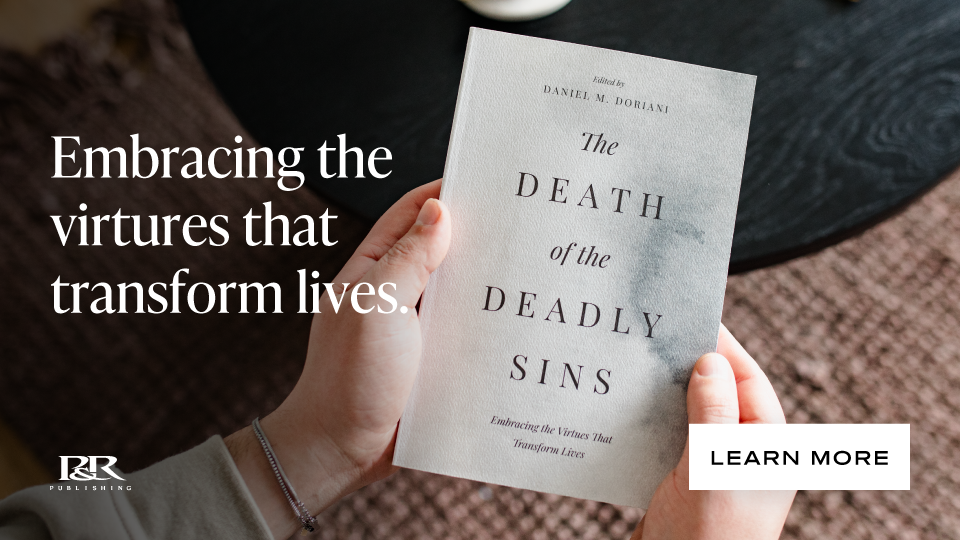 ]]>
]]>Knowledge should lead to worship. The true knowledge of God will result not in our being puffed up with conceit at how knowledgeable we are, but in our falling on our faces before God in sheer wonder and crying, “O the depths of the riches and wisdom and knowledge of God! How unsearchable are his judgments and how inscrutable his ways!” Whenever our knowledge becomes dry or leaves us cold, something has gone wrong. For whenever Christ opens the Scriptures to us and we learn from him, our heart should be aglow within us. The more we know God the more we should love him.
Second, knowledge should lead to faith. We have already seen that knowledge is the foundation of faith and makes faith reasonable. “Those who know thy name put their trust in thee,” wrote the psalmist. It is our very knowledge of God’s nature and character which elicits our faith. But if we cannot believe without knowing, we must not know without believing. That is, our faith must grasp hold of whatever truth God reveals to us. Indeed, God’s message brings no benefit unless it meets with faith in the hearers. This is why Paul does more than pray that the eyes of our hearts may be enlightened to know the greatness of God’s power which has been demonstrated in the resurrection; he adds that this power which God accomplished in Christ is now available to use who believe. The first and necessary step is that we know in our minds the magnitude of God’s power, but this should lead us to appropriate his power in our lives by faith.
Third, knowledge should lead to holiness. We have to see how the more our knowledge grows, the greater our responsibility to put it into practice. Many biblical examples could be quoted. Psalm 119 is full of aspirations to know God’s law. Why? In order the better to obey it: “Give me understanding, that I may keep thy law and observe it with my whole heart.” Thomas Manton, the Puritan minister, who at one time was Oliver Cromwell’s chaplain, likened a disobedient Christian to a child suffering from rickets: “Rickets cause great heads and week feet. We are not only to dispute of the word, and talk of it, but to keep it. We must neither be all ear, nor all head, nor all tongue, but the feet must be exercised!”
Fourth, knowledge should lead to love. The more we know, the more we should want to share what we know with others and use our knowledge in their service, whether in evangelism or ministry. Sometimes, however, our love will restrain our knowledge. For by itself knowledge can be harsh; it needs to sensitivity which love can give it. This is what Paul meant when he wrote: “Knowledge puffs up, but love builds up.”
Knowledge is indispensable to Christian life and service. If we do not use the mind which God has given us, we condemn ourselves to superficiality and cut ourselves off from many of the riches of God’s grace. At the same time, knowledge is given us to be used, to lead us to higher worship, greater faith, deeper holiness, better service. What we need is not less knowledge but more knowledge, so long as we act upon it.
Image credit: Shutterstock
]]> Commentary Sale – Westminster Books is having a fantastic commentary sale, offering paperback volumes in the solid Tyndale Commentary series for just $10 each (which is very, very low). Stay tuned and I’ll post an article suggesting which are the best in the series. Does R.C. Sproul Believe in Miracles? – “If you want me to give the simple answer, the answer is no. [I]f you expect a miracle—if miracles are expectable—there’s nothing miraculous about them.” However… The Well-Gifted Grad – Here are some solid ideas for books to gift to grads. Rome, Her Saints, and the Gospel – “What is a saint? How does one become a saint? And what is Rome doing when they canonize someone?” 4 Principles for Finishing Well – This one is for students who can just about smell the summer coming. Five Things Every Christian Should be Doing with God’s Word – In Psalm 119 we find “David interacting with the Word of God in five ways that should be paradigmatic for all believers…” Ten Unforgettable Lessons – Ray Ortlund shares 10 unforgettable lessons on fatherhood that he learned from his own father. Maybe the reason we’re not humbled by the holiness of God is we’ve fashioned a God who is just like us.]]>
Commentary Sale – Westminster Books is having a fantastic commentary sale, offering paperback volumes in the solid Tyndale Commentary series for just $10 each (which is very, very low). Stay tuned and I’ll post an article suggesting which are the best in the series. Does R.C. Sproul Believe in Miracles? – “If you want me to give the simple answer, the answer is no. [I]f you expect a miracle—if miracles are expectable—there’s nothing miraculous about them.” However… The Well-Gifted Grad – Here are some solid ideas for books to gift to grads. Rome, Her Saints, and the Gospel – “What is a saint? How does one become a saint? And what is Rome doing when they canonize someone?” 4 Principles for Finishing Well – This one is for students who can just about smell the summer coming. Five Things Every Christian Should be Doing with God’s Word – In Psalm 119 we find “David interacting with the Word of God in five ways that should be paradigmatic for all believers…” Ten Unforgettable Lessons – Ray Ortlund shares 10 unforgettable lessons on fatherhood that he learned from his own father. Maybe the reason we’re not humbled by the holiness of God is we’ve fashioned a God who is just like us.]]>
Commentary Sale – Westminster Books is having a fantastic commentary sale, offering paperback volumes in the solid Tyndale Commentary series for just $10 each (which is very, very low). Stay tuned and I’ll post an article suggesting which are the best in the series.
Does R.C. Sproul Believe in Miracles? – “If you want me to give the simple answer, the answer is no. [I]f you expect a miracle—if miracles are expectable—there’s nothing miraculous about them.” However…
The Well-Gifted Grad – Here are some solid ideas for books to gift to grads.
Rome, Her Saints, and the Gospel – “What is a saint? How does one become a saint? And what is Rome doing when they canonize someone?”
4 Principles for Finishing Well – This one is for students who can just about smell the summer coming.
Five Things Every Christian Should be Doing with God’s Word – In Psalm 119 we find “David interacting with the Word of God in five ways that should be paradigmatic for all believers…”
Ten Unforgettable Lessons – Ray Ortlund shares 10 unforgettable lessons on fatherhood that he learned from his own father.
]]> Kevin DeYoung is quickly becoming one of my go-to authors. One of his strengths as an author is taking difficult concepts out of the academy and bringing it to those of us who do better reading at a more popular level. He did this in Why We’re Not Emergent, the book that introduced us to him, and has done it in most of the books he has written since. His newest book, Taking God at His Word, is all about the Bible and about loving the Bible and, once again, it is targeted at the general reader. He begins in Psalm 119, David’s long love song dedicated to the Bible. He begins here because David’s love for God’s Word, and David’s awe of that Word, is exactly where DeYoung wants the reader to be by the time he has finished this book. This means he starts with the application, so to speak, and then works to the information and the defense—an interesting and rather helpful way of going about things. He wants us, like David, to believe the Bible, to feel love for the Bible, and to do what the Bible says. In the second chapter DeYoung turns to 2 Peter 1 to look at the nature of the Bible as God’s inerrant revelation of himself, given through the agency of human beings who received and transmitted those words. There is nothing more steady and sure than this Word. “You do not need another special revelation from God outside the Bible. You can listen to…]]>
Kevin DeYoung is quickly becoming one of my go-to authors. One of his strengths as an author is taking difficult concepts out of the academy and bringing it to those of us who do better reading at a more popular level. He did this in Why We’re Not Emergent, the book that introduced us to him, and has done it in most of the books he has written since. His newest book, Taking God at His Word, is all about the Bible and about loving the Bible and, once again, it is targeted at the general reader. He begins in Psalm 119, David’s long love song dedicated to the Bible. He begins here because David’s love for God’s Word, and David’s awe of that Word, is exactly where DeYoung wants the reader to be by the time he has finished this book. This means he starts with the application, so to speak, and then works to the information and the defense—an interesting and rather helpful way of going about things. He wants us, like David, to believe the Bible, to feel love for the Bible, and to do what the Bible says. In the second chapter DeYoung turns to 2 Peter 1 to look at the nature of the Bible as God’s inerrant revelation of himself, given through the agency of human beings who received and transmitted those words. There is nothing more steady and sure than this Word. “You do not need another special revelation from God outside the Bible. You can listen to…]]>
Kevin DeYoung is quickly becoming one of my go-to authors. One of his strengths as an author is taking difficult concepts out of the academy and bringing it to those of us who do better reading at a more popular level. He did this in Why We’re Not Emergent, the book that introduced us to him, and has done it in most of the books he has written since. His newest book, Taking God at His Word, is all about the Bible and about loving the Bible and, once again, it is targeted at the general reader.
He begins in Psalm 119, David’s long love song dedicated to the Bible. He begins here because David’s love for God’s Word, and David’s awe of that Word, is exactly where DeYoung wants the reader to be by the time he has finished this book. This means he starts with the application, so to speak, and then works to the information and the defense—an interesting and rather helpful way of going about things. He wants us, like David, to believe the Bible, to feel love for the Bible, and to do what the Bible says.
In the second chapter DeYoung turns to 2 Peter 1 to look at the nature of the Bible as God’s inerrant revelation of himself, given through the agency of human beings who received and transmitted those words. There is nothing more steady and sure than this Word. “You do not need another special revelation from God outside the Bible. You can listen to the voice of God every day. Christ still speaks, because the Spirit has already spoken. If you want to hear from God, go to the book that records only what he has said. Immerse yourself in the word of God. You will not find anything more sure.”
Over the next four chapters he uses the acronym SCAN to highlight four essential characteristics of the Bible: Sufficiency, Clarity, Authority, and Necessity.
Sufficiency. The Scriptures contain everything we need for knowledge of salvation and godly living. We don’t need any new revelation from heaven.
Clarity. The saving message of Jesus Christ is plainly taught in the Scriptures and can be understood by all who have ears to hear it. We don’t need an official magisterium to tell us what the Bible means.
Authority. The last word always goes to the word of God. We must never allow the teachings of science, of human experience, or of church councils to take precedence over Scripture.
Necessary. General revelation is not enough to save us. We cannot know God savingly by means of personal experience and human reason. We need God’s word to tell us how to live, who Christ is, and how to be saved.
This is to say that God’s Word is enough, clear, final, and necessary.
Having put each of these pieces in place, he looks at how Jesus understood the Bible. As Christians we necessarily wish to imitate Christ and this ought to include imitating him in his understanding of the Bible. DeYoung turns to several passages to show that Christ who was the Word, loved and honored the Word. “It is impossible to revere the Scriptures more deeply or affirm them more completely than Jesus did.”
Finally, he concludes with a call to stick with the Scriptures—not to move on and not to pursue something else. And really, if we agree with anything he has taught in the previous seven chapters, we would be crazy to do anything else but to stand with and stand upon God’s Word.
Taking God at His Word isn’t a book that teaches a method for studying the Bible; it doesn’t teach how to interpret or apply Scripture during personal devotions. It does something more foundational: It teaches why and how we ought to honor and respect God’s Word. DeYoung does not rely on flashy defenses or apologetics. Instead, “my conviction, born out of experience and derived from the teaching of Scripture itself, is that the most effective means for bolstering our confidence in the Bible is to spend time in the Bible.” This is just what he does. “My aim is to be simple, uncluttered, straightforward, and manifestly biblical. I make no pretenses about offering you anything other than a doctrine of Scripture derived from Scripture itself.”
There are many books that do roughly the same thing Taking God at His Word does, but they tend to do it on a technical or academic level. DeYoung’s book is written for a very different audience and is meant to be entry-level and reader-friendly. It succeeds well.
At Grace Fellowship Church we like to stock up on books when we can get them at great prices and give them away at strategic times. This is just the kind of book we love to buy and distribute. Every Christian needs to be anchored in the Scriptures and needs to grow in his love for Scripture. Taking God at His Word will help in both respects.
]]>


